- International
- Today’s Paper
- Mumbai News
- Chandigarh News
- Bangalore News
- Lucknow News
- Ahmedabad News
- Chennai News

PM Modi’s US visit ends: Here are some highlights
Prime minister modi wrapped up his three-day state visit to the united states with an address to the indian community members..
Prime Minister Narendra Modi wrapped up his state visit to the United States on Friday. The three-day state visit, his first in nine years, included at least three meetings with President Joe Biden, an address to members of the US Congress, and interactions with some of Silicon Valley’s top CEOs.
“Concluding a very special USA visit, where I got to take part in numerous programmes and interactions aimed at adding momentum to the India-USA friendship. Our nations will keep working together to make our planet a better place for the coming generations,” PM Modi tweeted, ahead of his departure. He is now headed to Egypt for another state visit.

👉 Click here to register!
Here’s a round-up of the significant events from PM Modi’s official three-day State visit to the US as a representative of the Republic of India:
PM Modi delivers goodbye speech to Indian-American diaspora
“‘Together India and US are not just forming policies and agreements, we are shaping lives, dreams and destinies," said PM Narendra Modi addressing the Indian-American community at the end of his three-day state visit to the US.
“The partnership between India and the United States will make the world better in the 21st Century. You all play a crucial role in this partnership,” he added while speaking at Ronald Reagan Center, Washington on Friday.
At the heart of the Indo-US strategic partnership is deepening economic engagement and resolve on both sides to elevate the bilateral relationship to a “global strategic partnership”. Concluding the hour-long address amid cheers and chants of Bharat Mata ki Jai, the PM said, “I can sense a mini-India converging here. I thank you all for coming here. I have received unprecedented love and affection during my stay in the US.”
A joint statement is issued by India and the United States
India and the US have agreed on a broad sweep in ties , declaring that “no corner of human enterprise is untouched by the partnership between our two great countries, which spans the seas to the stars”. A 58-paragraph joint statement was issued after the bilateral meeting between PM Modi and President Joe Biden. The statement called on Pakistan to take action to ensure that no territory under its control is used for launching terrorist attacks. However, there was no mention of Russia or the US formulation on the Russian invasion of Ukraine.
A celebrity-studded state dinner in honour of PM Modi is organised
“Two great nations, two great friends, and two great powers. Cheers,” US President Biden told PM Modi in a toast at the state dinner Thursday hosted by US President at White House. Both the leaders expressed that the occasion celebrates great bonds of friendship between India and the United States. They hailed a new era in their nation’s relationship and spoke about deals on defence and commerce, which are aimed at countering China’s influence.
Big names in the tech world and billionaire industrialists such as Mukesh Ambani, Google CEO Sunder Pichai and Apple CEO Tim Cook were among those invited to the State Dinner hosted in the honour of Prime Minister Narendra Modi at the White House on Thursday.
PM Modi addresses the US Congress, becoming the first Indian prime minister to do so twice
In an almost one hour speech to the US Congress, Prime Minister Narendra Modi touched upon a variety of themes ranging from the Ukraine war to terrorism to women's empowerment to environment concerns. They were met with applause and standing ovation several times by the US Congress members, including Vice President Kamala Harris. “When India grows, it influences and uplifts everyone,” he told the American parliament.
The speech this time was longer in duration than last time, which was about 45 minutes in 2016.
Modi-Biden hold joint press conference at the White House
At a joint press conference with US President Joe Biden at the White House, PM Modi declares that the partnership between India and the US knows no bounds. At the press conference where the leaders took questions from one reporter from each side, Biden by his side, PM Modi said Thursday that “democracy is in our DNA”, and “there is absolutely no question of discrimination” regardless of “caste, creed, religion and gender”. He was responding to a journalist’s question about what steps his government is willing to take to improve the rights of minorities in India and to uphold free speech.
Bilateral meeting takes place at the White House
The bilateral meeting between PM Modi and US President Joe Biden took place at the White House ahead of the former's address at the US Congress. White House officials previewed the possible outcomes of the official meet : a mega deal on the purchase of General Atomics MQ-9 “Reaper” armed drones by India, a joint mission by the NASA and ISRO to the International Space Station in 2024 and New Delhi joining the Artemis Accords, which brings like-minded countries together on civil space exploration.
Biden by his side in the East Room of the White House, Modi, too, headlined the strategic outcomes in his statement after the bilateral meeting between the two sides.
PM Modi presents an array of special gifts to President Biden and US First Lady
PM Modi presented an array of special gifts to US President Joe Biden and First Lady Jill Biden when they hosted him for a private dinner at the White House on Tuesday. The gifts included a lab-grown 7.5-carat green diamond and a handcrafted sandalwood box. Biden was also presented with the first edition print of the book The Ten Principal Upanishads from 1937.
A warm welcome for PM Modi at the White House
PM Narendra Modi received a warm welcome Thursday by United States president Joe Biden and First Lady Jill Biden, as he arrived at White House to attend bilateral talks with US President Joe Biden, attend a State dinner and address the US Congress. His state visit to the US as a representative of the Republic of India set against the backdrop of a rapidly transforming world order, where India needs to keep both its strategic independence and geopolitical balance.
PM Modi leads International Yoga Day celebrations at UN headquarters
Prime Minister Narendra Modi-led yoga session at United Nations headquarters, on the occasion of 9th International Yoga Day , created Guinness World Record for participation of people of most nationalities , according to officials.
PM Modi arrives in New York, meets Tesla CEO Elon Musk
Prime Minister Narendra Modi Tuesday arrived in New York on the first leg of his maiden state visit to the US at the invitation of President Joe Biden. H e met several business and thought leaders like Tesla CEO Elon Musk , Nobel Prize winner Paul Romer and astrophysicist Neil deGrasse Tyson. He also met with experts in healthcare, tech and education sectors and discussed the National Education policy, tuberculosis elimination efforts and policymaking, among other topics.
PM Modi leaves for US
PM Modi landed in New York late Tuesday evening, marking the beginning of his first State visit to the US, which he said “will reinforce ties based on shared values of democracy, diversity and freedom" with new milestones in the India-US relationship in Washington.
His packed state visit to the US from June 21 to June 23 upon the invitation of US President Joe Biden notably included International Yoga Day celebrations, a state dinner, bilateral meetings with Biden, a US Congress address and a speech to the Indian-American diaspora.
Click here to join The Indian Express on WhatsApp and get latest news and updates
- Modi in US 2023

A festival in Solingen, Germany turned deadly when a knife-wielding attacker left three dead and four seriously injured. The weapon and perpetrator are still at large, causing shock and sadness for the city's mayor. The festival, celebrating the city's 650th anniversary, was cut short and the city's population of 160,000 near Cologne and Duesseldorf is left in mourning.
- Kolkata doctor rape-murder case live updates: Calcutta HC transfers R G Kar Hospital ‘financial irregularities case’ to CBI 10 hours ago
- Delhi News Live Updates: CBI obtains sanction to prosecute Arvind Kejriwal in excise policy case 12 hours ago
- Bharat Bandh Live Updates: Amid protest against SC's sub-classification verdict, police lathicharge protesters in Patna 3 days ago

Best of Express
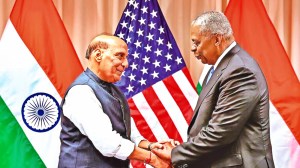
Buzzing Now

Aug 24: Latest News
- 01 Asian migrants, including Indians, trapped for weeks in Brazilian airport limbo
- 02 Express News Quiz: Stree 2, SEBI, immortality & falls from grace
- 03 School education, WCD depts part of new committee to ensure safety of girls
- 04 Man held for sexually assaulting two-year old girl in Mumbai: Cops
- 05 After Badlapur incident: Maharashtra education minister suspends Mumbai, Thane education officers
- Elections 2024
- Political Pulse
- Entertainment
- Movie Review
- Newsletters
- Web Stories
- 🇮🇳 I-Day SALE
- Express Shorts
- Mini Crossword
- Health & Wellness
- Work & Careers
- Life & Arts
US and India announce defence and technology deals during visit by Narendra Modi
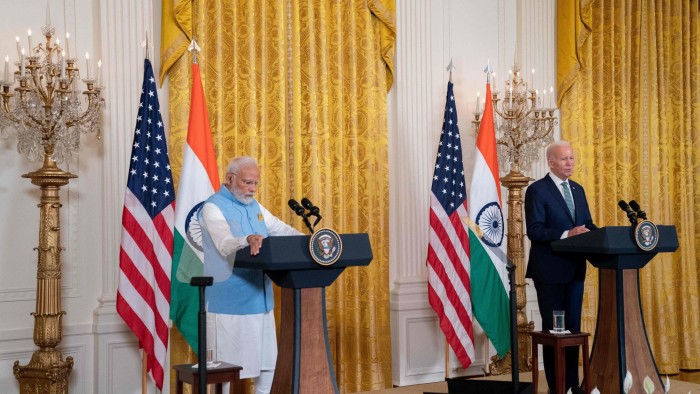
- US and India announce defence and technology deals during visit by Narendra Modi on x (opens in a new window)
- US and India announce defence and technology deals during visit by Narendra Modi on facebook (opens in a new window)
- US and India announce defence and technology deals during visit by Narendra Modi on linkedin (opens in a new window)
- US and India announce defence and technology deals during visit by Narendra Modi on whatsapp (opens in a new window)
Demetri Sevastopulo in Washington and John Reed in New Delhi
The stories that matter on money and politics in the race for the White House
Joe Biden welcomed Narendra Modi to the White House on Thursday for a state visit during which the US and Indian leaders announced defence and technology deals, including a purchase of American spy drones.
Modi and Biden held talks in the Oval Office before giving a news conference — a rare event as the Indian prime minister has not held one in years. Biden told reporters that the partnership between the US and India was “stronger, closer and more dynamic than any time in history”, while Modi spoke of a “new chapter” in the strategic relationship between the two countries.
India’s prime minister will speak to Congress before attending a state banquet at the White House.
Speaking in front of hundreds of Indian Americans, Modi earlier described the welcome ceremony as “an honour and pride for [the] 1.4bn people of India”.
“The 1.4bn people of India wish with me for India’s tricolour and America’s stars and stripes to always keep flying higher and higher,” Modi said via a translator, before saying “God bless America” in English.
Modi is only the third world leader to make a state visit to the US since Biden took office. His speech to Congress will make him one of only a handful of leaders to address the House and Senate more than once.
Ahead of the visit, US officials said India would commit to buying armed MQ-9B SeaGuardian drones, which are produced by US defence contractor General Atomics. The leaders will also announce that memory chipmaker Micron will open a $2.75bn semiconductor assembly and test facility in India, which will include $800mn in investment from the US company.
“After years of strengthening ties in a bipartisan context, the US-India partnership is deeper and more expansive than . . . ever,” said a senior US official.
Biden and Modi also signed an agreement that will result in General Electric co-producing fighter jet engines in India , which the Biden administration described as a “trailblazing initiative”.
The agreements, which also include efforts to boost co-operation in space, mark a big push by Washington to draw New Delhi into its orbit as part of a strategy to work with allies and partners to counter China.
Since taking office, Biden has invested in boosting defence and security co-operation with New Delhi, including resurrecting the “Quad” security group that includes India, Japan and Australia.
While India maintains a non-aligned foreign policy, it has moved closer to the US amid rising tensions with China.
India and China have an unresolved dispute along their nearly 3,500km-long border, which last escalated into violence in May 2020 when Chinese and Indian troops clashed in the Galwan Valley.
American officials say the clashes have made India more willing to partner with Washington.
A US defence official this week said the security deals being announced during the visit would boost interoperability between the two militaries.
Asked what role India would play in the case of a conflict over Taiwan, the senior US official refused to provide specifics, but said the countries were working more closely on maritime and other contingencies.
“We are planning more together, we are training more together,” he said.
“We’re engaging in a variety of scenario developments,” he added. “You will see that co-operation will extend increasingly not just to the Indian Ocean but to the Pacific Ocean.”
Biden has come under criticism for granting Modi a state visit, given accusations from critics that Indian democracy is under threat from a squeeze on free expression and incitement of violence against minority Muslims and Christians.
The senior US official said Biden would approach discussions about human rights with “a degree of humility” and would not engage in “hectoring, lecturing or scolding”. After the meeting Biden said he had a “good discussion” with Modi about “democratic values” common to both countries.
Modi added: “Democracy runs in our veins, we live democracy.”
Follow Demetri Sevastopulo on Twitter
Promoted Content
Follow the topics in this article.
- US & Canadian companies Add to myFT
- US-China relations Add to myFT
- Aerospace & Defence Add to myFT
- Technology sector Add to myFT
- Indian politics & policy Add to myFT
Indian Prime Minister Modi’s Visit to Washington Is His Most Important So Far. Here’s What to Know
O n Thursday, U.S. President Joe Biden will meet India’s Prime Minister Narendra Modi on an official state visit in Washington D.C, which includes a South Lawn welcome, a state dinner, and an address to a joint session of Congress—an honor rarely granted to a visiting foreign leader. Modi will become just the third world leader, after France’s Emmanuel Macron and South Korea’s Yoon Suk Yeol, to receive this kind of diplomatic reception from President Biden.
While Modi has visited the U.S. many times—most recently for a three-day visit in September 2021, where he held a bilateral meeting with Biden—this will be the first time the Prime Minister’s trip will be categorized as the highest ranked visit according to diplomatic protocol. (The last state visit to the U.S. by an Indian leader was by former Prime Minister Manmohan Singh in November 2009.)
As India takes center stage as the world’s most populous country , one of the fastest growing economies, and a powerhouse for tech and innovation, the Biden Administration hopes it can court the country as a crucial ally to counter China’s growing influence in the Indo-Pacific region.
Read More: How India’s Record-Breaking Population Will Shape the World
More from TIME
“The visit will strengthen our two countries’ shared commitment to a free, open, prosperous and secure Indo-Pacific and our shared resolve to elevate our strategic technology partnership, including in defense, clean energy, and space,” the White House Press Secretary Karine Jean-Pierre said in a statement .
Below, what to know about the upcoming visit.
What are the top priorities for Modi’s state visit?
The state visit will include conversations aimed at further cementing an already-growing defense and manufacturing relationship between the U.S. and India. More recently, Washington and New Delhi have been engaged in discussions about jointly producing jet engines, long-range artillery, and military vehicles. In May, India joined Biden’s 14-member Indo-Pacific Economic Framework, which primarily aims to reduce China’s economic dominance through manufacturing, but without drawing up a formal trade agreement. Now, American company General Electric is hoping to co-produce military jets in the country, while the U.S. has increased investment in a semiconductor and chip manufacturing ecosystem set in India as a way to decrease dependence on Chinese manufacturing.
“The United States has really oriented a lot of its domestic and foreign policy around this question of, ‘how do we counter the Chinese challenge?’” says Milan Vaishnav, director of the South Asia Program at Carnegie. “So if you think about semiconductors and chip manufacturing, India is a big player right now.”
In the weeks leading up to Modi’s visit, both the U.S. Secretary of Defense Lloyd Austin and National Security Advisor Jake Sullivan have also made trips to New Delhi in an attempt to cut through the red tape to secure deals.
Read More: What Modi’s Visit to Washington Tells Us About Indian American Voters
This week, Reuters reported that India was inching closer to buying more than two dozen U.S.-made armed drones worth $2 to $3 billion to help enhance border surveillance and improve counterterrorism intelligence operations. The development comes after Sullivan, along with India’s National Security Advisor Ajit Doval, unveiled an ambitious roadmap for Indo-U.S. collaboration in specific high-technology areas, including semiconductors, next-generation telecommunication, artificial intelligence and defense.
For India, striking deals with the U.S. will in turn strengthen the country’s hard power capabilities and make it a hotbed for innovation. “They are hoping to get more U.S. dollars, more U.S. companies, and more U.S. entrepreneurs to make India a central part of their growth and expansion plans,” says Vaishnav.
Why do the U.S. and India want to counter China?
Experts say both countries see their strategic interests converge in countering China’s threat as it becomes more expansionist and ambitious on the global stage. For the U.S., China has increasingly become its biggest competitor in the spheres of influence, while India has been embroiled in territorial disputes in the Himalayas ever since it fought a brief war with China in 1962.
In 2020, tensions between India and China flared when Beijing became more assertive over land claims along the shared Himalayan border and an altercation between Indian and Chinese military forces in the northern Indian region of Ladakh reportedly left 20 Indian and four Chinese soldiers dead. China’s close ties to Pakistan has also resulted in the China-Pakistan Economic Corridor as part of the Belt and Road Initiative and controversially passes through a section of Kashmir controlled by Islamabad, adding to India’s concerns.
By helping India build up its economic and defense capabilities, Washington hopes to coordinate with New Delhi to tackle global challenges as part of its long-term interests, says Vaishnav. “Washington is really looking to create a framework of deterrence to essentially deter Chinese expansionism, and they view India as a linchpin in this strategy,” he says.
How has the relationship between India and the U.S. changed?
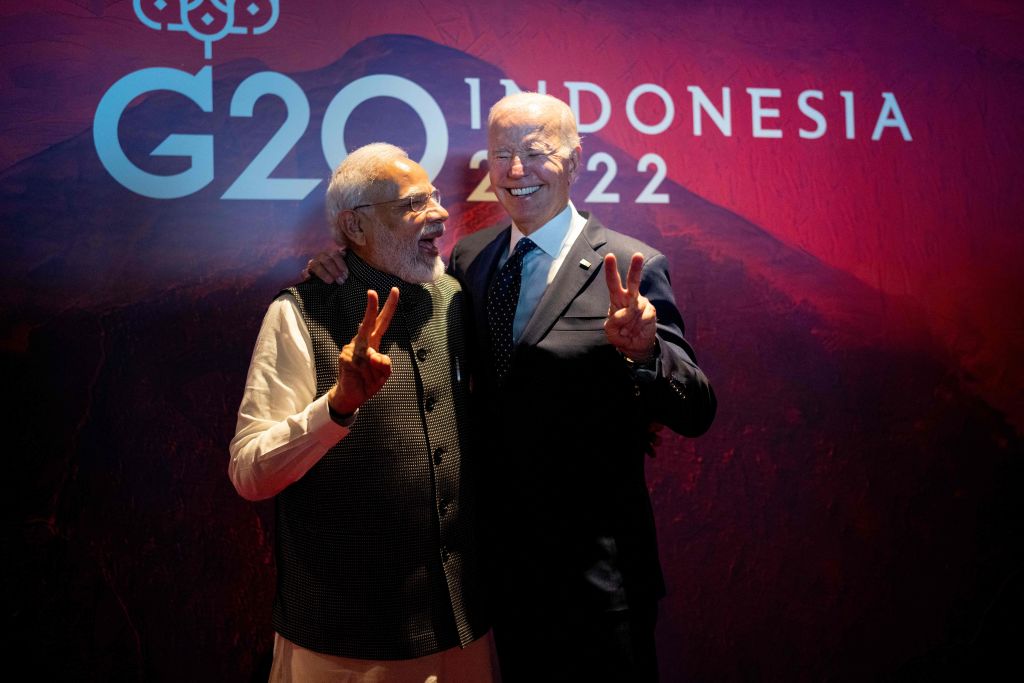
Relations between India and the U.S. have changed in notable ways over the years. After independence from British rule in 1947, India was more closely aligned with Russia during the Cold War era due to U.S. distrust and estrangement over India’s nuclear program, while the U.S. had a stronger partnership with India’s rival, Pakistan.
The two countries remained “estranged democracies,” according to the former U.S. Ambassador, Dennis Kux, until the early 1990s. However, since the early 2000s, U.S. administrations from Bill Clinton to Donald Trump have worked to build a strong relationship with India, recognizing its potential to be a strategic partner in ensuring the security of the Indo-Pacific region.
In 2005, India and the U.S. signed a major nuclear deal under which India was recognized de facto as a nuclear weapons power. More recently, India’s participation in the Quad, a security alliance between the U.S. and its allies, Australia, Japan and India, has led to the country becoming a critical element of American defense strategy.
Last year, the two countries conducted joint military exercises not far from the disputed Indo-China border, and in May, joined Biden’s 14-member Indo-Pacific Economic Framework, which officials and business executives hope will reduce American reliance on Chinese manufacturing for mutual benefit, including increased iPhone shipments from Indian-based factories.
More Must-Reads from TIME
- Breaking Down the 2024 Election Calendar
- Heman Bekele Is TIME’s 2024 Kid of the Year
- The Reintroduction of Kamala Harris
- What a $129 Frying Pan Says About America’s Eating Habits
- A Battle Over Fertility Law in China
- The 1 Heart-Health Habit You Should Start When You’re Young
- Cuddling Might Help You Get Better Sleep
- The 50 Best Romance Novels to Read Right Now
Write to Astha Rajvanshi at [email protected]
- Skip to main content
- Keyboard shortcuts for audio player
Indian Prime Minister Modi to visit the U.S.

Ayesha Rascoe
NPR's Ayesha Rascoe speaks to Seema Sirohi – a columnist for The Economic Times – about Indian Prime Minister Narendra Modi's state visit to the US this week.
Copyright © 2023 NPR. All rights reserved. Visit our website terms of use and permissions pages at www.npr.org for further information.
NPR transcripts are created on a rush deadline by an NPR contractor. This text may not be in its final form and may be updated or revised in the future. Accuracy and availability may vary. The authoritative record of NPR’s programming is the audio record.
Here's why Democrats and Republicans welcome a visit from right-wing Indian PM Narendra Modi
WASHINGTON – President Joe Biden and congressional leaders will roll out the red carpet for Indian Prime Minister Narendra Modi on Thursday, as the right-wing Hindu nationalist leader arrives for an official state visit to the United States.
Modi will address a joint session of Congress and will be feted at a White House state dinner — a diplomatic honor usually reserved for close allies. On Sunday, many Indian Americans took to the streets in major cities across the country for an "India Unity Day" march to welcome Modi to the U.S.
The marches, organized by the American overseas arm of Modi's right-wing Bharatiya Janata Party, were a show of support for the controversial Indian leader who has faced criticism for presiding over human rights violations, an erosion of the country's democracy, and a crackdown in Indian-controlled Kashmir.
That Democrats and Republicans alike are honoring Modi this week demonstrates the White House and Congress are willing to overlook his right-wing populist agenda in the pursuit of a strategically important relationship that will allow the U.S. to counter China's influence .
Why the U.S. relationship with India is 'strategically important'
Meanwhile, Modi's political allies in Washington stepped up their lobbying efforts with members of Congress and the Biden administration ahead of his official state visit this week.
Sanjay Puri, the chairman and founder of the bipartisan U.S.-India Political Action Committee (USINPAC), said that in their lobbying efforts, the group has sought to underscore that India is "the only democracy in that region" and emphasize that the rise of China resulted in the U.S.-India partnership becoming a "strategically important relationship."
"That's been our push," Puri said of the group's discussions with lawmakers ahead of Modi's visit. "It has resulted in, obviously, the [congressional] leadership asking him to come in and speak and also President Biden inviting him for a state dinner as well as several other activities around that."
In addition to combatting American criticism of the Indian government's human rights record, the welcome marches likely also sought to enhance Modi's political image at home ahead of a general election next year, according to Gautam Nair, a professor of public policy at the Harvard Kennedy School.
"This visit actually should buttress his domestic political standing," Nair, who was born and raised in India, said. "And these rallies sort of suggest, or help foster an image, that he is an international leader of stature as well."
Mukesh Aghi, president of the U.S.-India Strategic Partnership Forum, said the "the Indian diaspora is quite excited about what Modi is doing, excited about the direction of the country, and feel proud of their heritage."
Countering China
Modi's visit also comes just days after Secretary of State Antony Blinken met with senior Chinese officials in Beijing over the weekend, a bid to improve relations between the two superpowers after months of heightened tensions. Washington has increasingly looked to forge closer ties with New Delhi to counter China's rising political and economic influence.
Nair said he believes the rationale for giving Modi the star treatment during his visit to the United States is "quite clear."
"This extra effort is because traditionally India has been wary of forging formal alliances with great powers," Nair said. "This is reflected in the fact that on the one hand, defense ties, diplomatic ties, economic ties are deepening with the United States, and at the same time China is a huge trading partner for India."
Aghi said he expects Modi's visit to yield a deal that will allow General Electric to manufacture jet engines in India for the country's military aircrafts, in addition to fostering discussions on healthcare and artificial intelligence between the two countries.
"I think what we're seeing is a much more deeper collaboration on technology, investments, and defense," Aghi said.
How this U.S.-India partnership could be one of the most significant in a century
Rep. Ro Khanna , D-Calif., who serves as a co-chair of the U.S.-India congressional caucus, told USA TODAY he believes the "U.S.-India partnership will be one of the most significant of this century."
"We will be working to strengthen the technology and defense relationship and to promote scientific research and cooperation on climate change initiatives," Khanna said.
Former South Carolina Gov. Nikki Haley , a 2024 Republican presidential candidate and the daughter of Indian immigrants, said she also welcomed the decision to invite Modi for an official state visit.
"India is a critically important country in the Indo-Pacific region and a natural ally of America with so many shared values and interests," Haley told USA TODAY. "It is entirely appropriate that Prime Minister Modi should address Congress and be celebrated at the White House."
Biden and American political leaders, however, have faced criticism for giving Modi the official state visit treatment without putting a stronger focus on the rollback of press freedoms in India and his government's treatment of minority Muslims and Christians.
"The relationship must be grounded on a respect for pluralism, an open internet, human rights and liberal democracy," Khanna said.
Why it matters: Secretary Blinken visits Beijing as tensions grow between U.S. and China
PM Modi US visit: Dates, full schedule, events, agenda, and more
PM Modi's US visit would focus on strengthening ties, addressing mutual challenges, promoting trade relationships, and more
Day 1, June 21: Yoga in New York
Day 2, june 22: congress address, state reception, and state dinner, june 23: ceo meetings, lunch at state dept, and mega event for indian diaspora, june 24: pm modi will forge new paths in egypt.
- " class="general-icons icon-sq-googleplus popup">
- " class="general-icons icon-sq-youtube">
Photo of the day: On winning streak
Gamescom: Microsoft seeks to win over new players
'Modern Family,' 'Friends,' 'Sex and the City' - could the characters have actually afforded their homes?
Air India: The story of a lost opportunity
Can senior politicians teach executives how to lead?
Photo of the day: Protests return to streets
New 'Call of Duty' and 'Borderlands 4' games announced at Gamescom
Liverpool house used for early Beatles gigs becomes holiday rental
How the 146-year-old Crompton has managed to stay afloat
Lessons and reforms for a fragile financial system
Flipkart-backed super.money irons out plans for secured lending
Didi & the rise of dronepreneurs
Photo of the day: Star power at Democratic National Convention
'Black Myth' elates fans and becomes one of China's most successful games
Five things to know as Taylor Swift's European tour ends
Biden welcomes Modi to White House in closely watched visit
The two leaders say their partnership would define the next century as the US eyes counterweight to China amid rights concerns in India.

Indian Prime Minister Narendra Modi and US President Joe Biden have faced direct questions at the White House over alleged human rights abuses committed under Modi’s leadership, as the leaders hail the need for an enduring partnership in the years ahead.
Biden and Modi held the brief news conference on Thursday during the Indian prime minister’s official state visit to the United States, which was set to be capped later in the night by a high-profile state dinner at the White House.

Keep reading
India’s modi faces human rights criticism ahead of us visit, what’s behind indian prime minister narendra modi’s us visit, biden will not ‘lecture’ modi on human rights, says white house.
“The prime minister and I had a good discussion about democratic values,” Biden said, when asked to respond to criticism the Biden administration was overlooking alleged rights abuses committed by Modi in the name of geopolitics. “And it’s a common Democratic….character of both our countries…and our people – our diversity our culture our open, tolerant, robust debate.”
“It is in American’s DNA, and I believe in India’s DNA that the whole world has a stake in our success, both of us, in maintaining our democracies,” he said.
When asked about the wide range of rights groups who have accused Modi’s government of restricting freedom of expression, discriminating against minorities, and stifling critics, Modi struck a defiant tone, saying he was “surprised” by the criticism.
“We have always proved that democracy can deliver. And when I say deliver, this is regardless of caste, creed, religion, gender, there’s absolutely no space for discrimination,” he said.
“And when you talk of democracy, if there are no human values, and there is no humanity, there are no human rights, then it’s not a democracy,” added Modi, who rarely takes direct questions from reporters.
‘Defining relationship’
Earlier in the day, Biden greeted the Indian leader on the South Lawn of the White House, an event marked by chants of “Modi, Modi, Modi” from supporters and the playing of the countries’ national anthems by a military band.
On Wednesday, Modi hosted a Yoga event at the United Nations headquarters in New York.
In Washington, both leaders hailed the need for a strong partnership in the years ahead, with concerns over stability in the Indo Pacific – and China’s growing influence – looming large.
Biden said the bond between the two countries will be a “defining relationship of the 21st century”.
Modi, speaking in Hindi, called the visit “an honour and pride for 1.4 billion people of India” and said it came as the “world order is taking a new shape”.
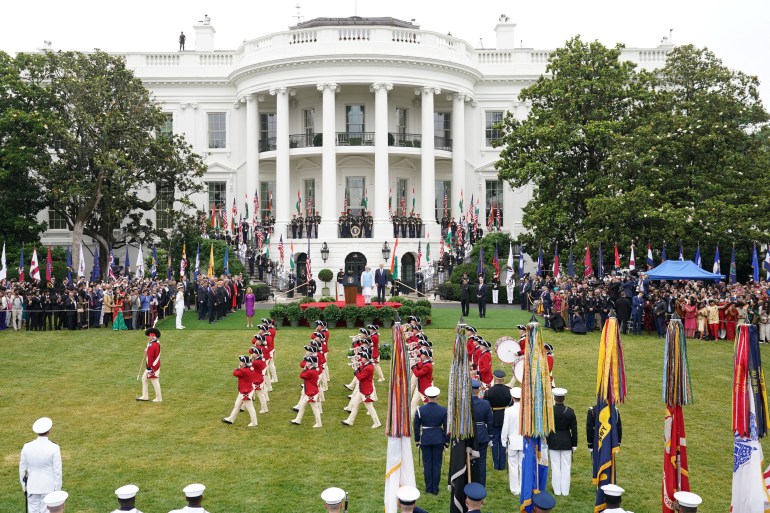
Following a subsequent Oval Office meeting, the two leaders vowed to boost cooperation on trade, protecting supply chains, strengthening emerging technologies, climate change and defence, among other areas of “strategic partnership”.
“Peace and security in the Indo Pacific is a common priority,” Modi told reporters. “We agree that the development and success of this region is important for the entire world.”
Modi has been to the United States five times since becoming prime minister in 2014, but this trip will be his first with the full diplomatic status of a state visit, a fact analysts said underscores how significant the Biden administration sees India’s role going forward.
Reporting from Washington, DC on Thursday, Al Jazeera’s Kimberly Halkett noted that only one other leader has been given such a welcome – with both a state dinner and an address to Congress – since Biden took office.
“The fact that he has kind of this double honour, it’s something that’s been bestowed only on one other world leader under the Biden presidency, and that is the leader of South Korea,” Halkett said, referring to South Korean President Yoon Suk-yeol’s visit in April, another event in which Biden sought to shore up support against China.
“It really underscores just how important this relationship is to the United States,” she said.
French President Emmanuel Macron did not speak to Congress during his state visit to Washington last December.
Still, seventy-five legislators from the president’s Democratic Party have also pushed the Biden administration to address the rights concerns during the visit. Three progressive Democrats – US Representatives Alexandria Ocasio-Cortez, Ilhan Omar and Rashida Tlaib – called on other elected officials to boycott Modi’s address to Congress.
“I encourage my colleagues who stand for pluralism, tolerance and freedom of the press to join me in doing the same,” Ocasio-Cortez said in a Twitter post on Wednesday.
On Thursday, former US President Barack Obama also weighed in, saying India risks “pulling apart” if rights of Muslim minority not respected.
“I think it is true that if the president meets with Prime Minister Modi, then the protection of the Muslim minority in a majority-Hindu India, that’s something worth mentioning,” Obama said in an interview with CNN International anchor Christiane Amanpour.
Previewing the meeting, a senior US official had said Biden would bring up rights concerns without “hectoring, lecturing or scolding” the Indian leader.
Biden administration officials also outlined a list of sweeping agreements expected to be reached during the visit – on semiconductors, critical minerals, technology, space cooperation and defence cooperation and trade.
The US would also like to see India move away from its ties with Moscow, including its reliance on Russian weapons exports. India has remained neutral in the wake of Russia’s war in Ukraine, abstaining from United Nations votes condemning the invasion.
Speaking on Thursday, Biden said the two leaders had discussed “shared efforts to mitigate humanitarian tragedies unleashed by Russia’s brutal war in Ukraine and to defend the core principles of UN Charter sovereignty and territorial integrity”.
Modi, in turn, said “India has laid emphasis on resolution of dispute through dialogue and diplomacy. We are completely ready to contribute in any way we can to restore peace”.
During the visit, the US and Indian leaders were set to sign off on what one official called a “trailblazing” deal to allow General Electric Co (GE) to produce jet engines in India to power Indian military aircraft. The company said on Thursday that it signed a memorandum of understanding with Hindustan Aeronautics Ltd to produce the engines.
In addition, US Navy ships in the region will be able to stop in Indian shipyards for repairs under a maritime agreement reached between the two governments.
The leaders were also set to announce India’s plan to procure US-made armed MQ-9B SeaGuardian drones, a US official said, adding: “We have now entered really a ‘next generation’ defence partnership.”
Defence, critical tech on agenda as India's Modi heads to US for landmark visit
- Medium Text
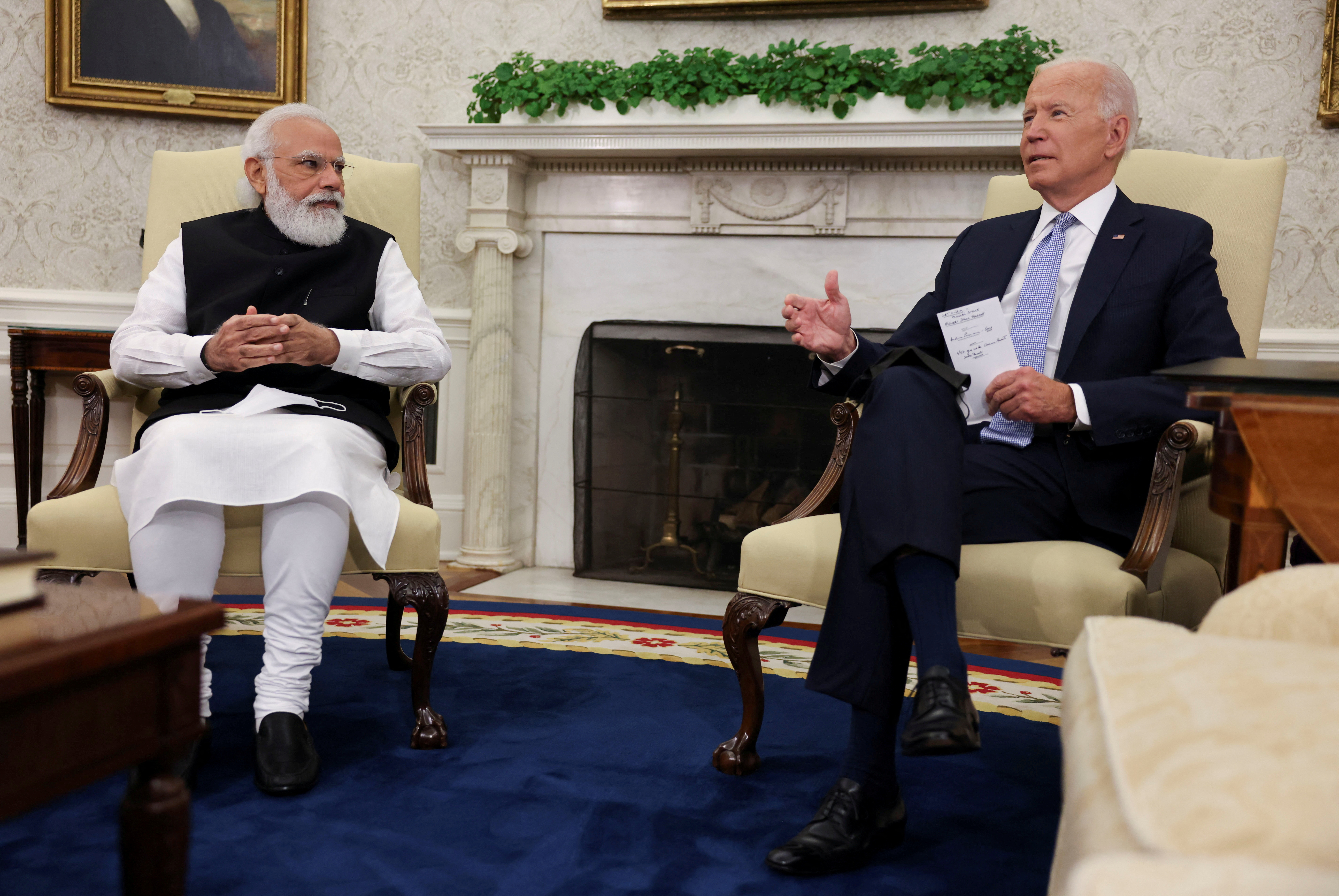
- U.S. expanding India ties to balance China’s rise
- Modi only third Indian leader invited for state visit
- Fighter jet engines, drones, semiconductors deals expected
JET ENGINES, DRONES, SEMICONDUCTORS
Sign up here.
Reporting by Krishn Kaushik and Sarita Chaganti Singh in NEW DELHI, David Brunnstrom in WASHINGTON; Editing by YP Rajesh
Our Standards: The Thomson Reuters Trust Principles. , opens new tab

Thomson Reuters
Krishn reports on politics and strategic affairs from the Indian subcontinent. He has previously worked at the Organized Crime and Corruption Reporting Project, an international investigative consortium; The Indian Express; and The Caravan magazine, writing about defence, politics, law, conglomerates, media, elections and investigative projects. A graduate of Columbia University's journalism school, Krishn has won multiple awards for his work.
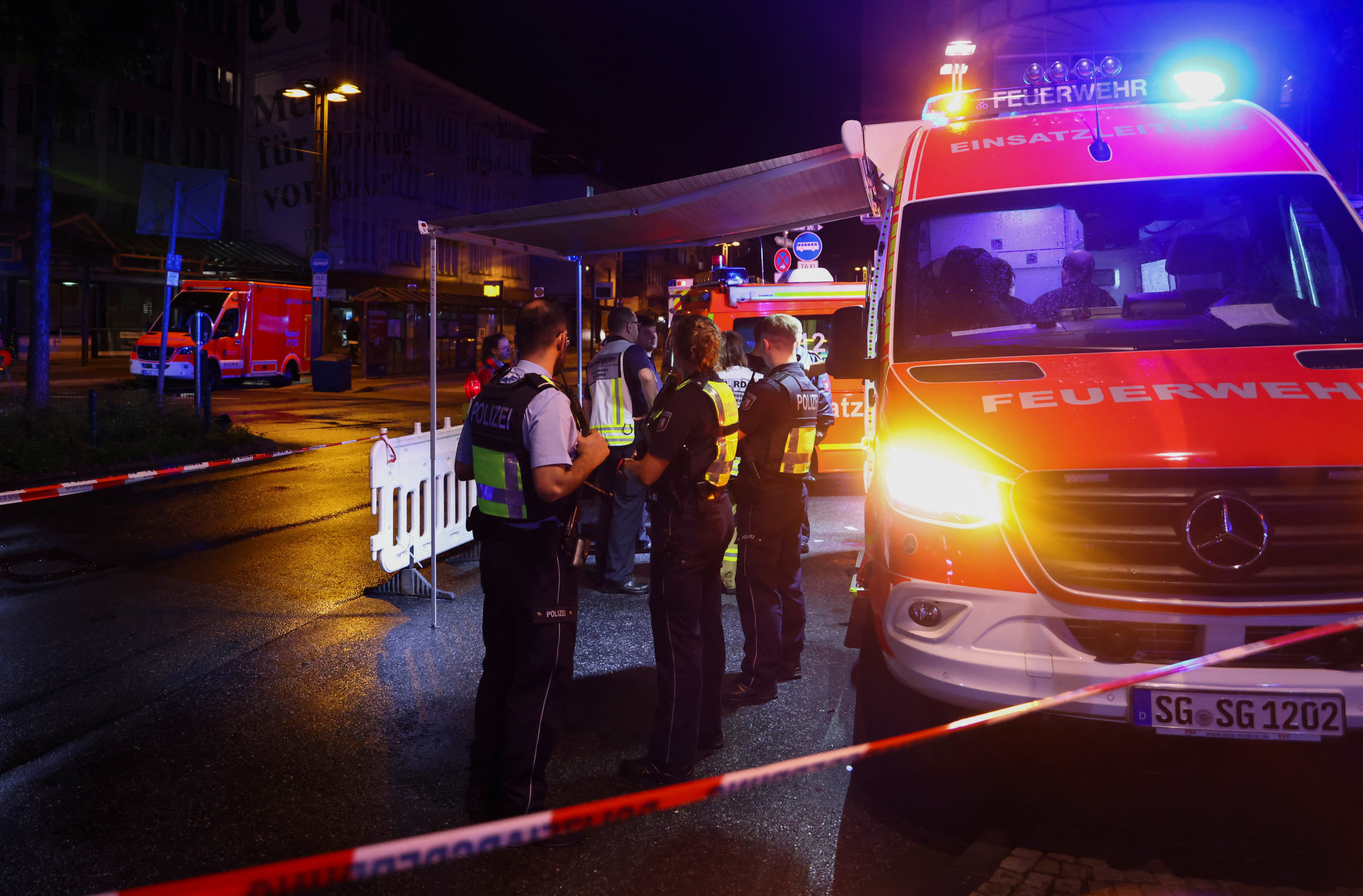
US military to deliver 24 more armored vehicles to Kenyan police in Haiti
The U.S. military said on Friday that it would deliver 24 additional armored vehicles to Kenyan personnel deployed in Haiti who are heading a long-delayed security operation in the conflict-ravaged Caribbean nation.
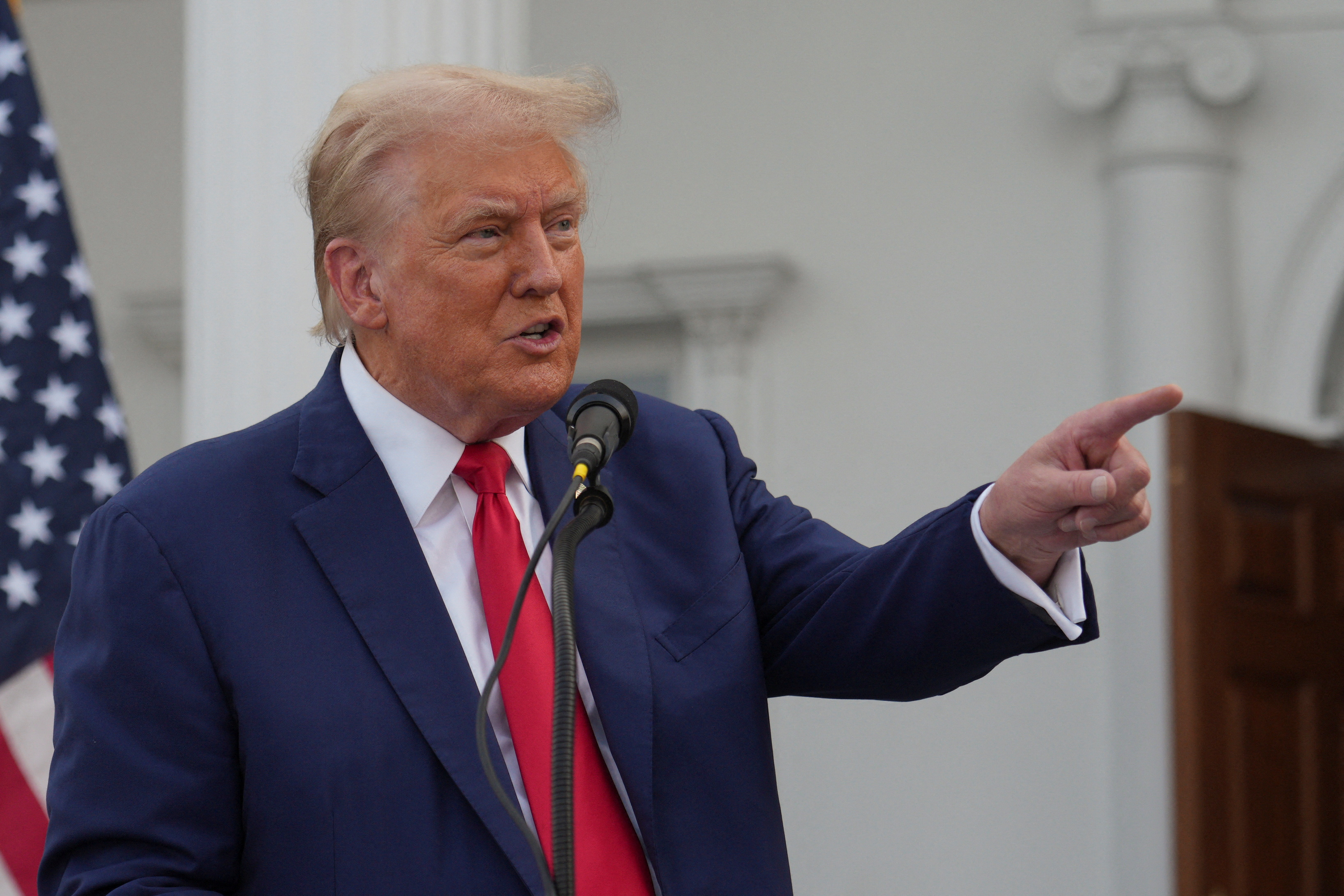
- ₹ 10 Lakh,1" data-value="Loan ₹ 10 Lakh">Loan ₹ 10 Lakh
- Games & Puzzles

- Entertainment
- Latest News
- Kolkata Doctor Rape Case Live
- Narendra Modi Ukraine Visit Live
- Web Stories
- Mumbai News
- Bengaluru News
- Daily Digest

‘Today, history was made’: Zelenskyy on Modi's Ukraine visit. His Instagram post breaks record
Ukraine president volodymyr zelenskyy called modi’s visit “friendly” and “symbolic” because modi came the day before ukraine’s independence day..
Ukraine President Volodymyr Zelenskyy acknowledged the significance of Prime Minister Narendra Modi's visit to Kyiv on Friday, as he listed the agreements reached by the two countries to deepen bilateral cooperation in various fields.

“Today, history was made,” Zelenskyy posted on X. “The Prime Minister of India @narendramodi made his first visit to Ukraine since our country's independence, on the eve of our Independence Day.”
The Ukrainian leader highlighted the signing of four bilateral agreements covering the medical field, agricultural cooperation, humanitarian relations, and culture, signalling a new chapter in Ukraine-India relations.
Also Read | What are BHISHM Cubes that PM Narendra Modi presented to Ukraine?
The visit saw the two leaders agree on a joint statement emphasising the development of a strategic partnership, bilateral trade, and continued military-technical cooperation.
“India supports Ukraine's national sovereignty and territorial integrity. And this is critical because everyone in the world must equally respect the UN Charter,” Zelenskyy added.
Zelenskyy's Instagram post with Modi
Zelenskyy also posted pictures of his meeting with PM Modi on his Instagram account, which quickly became his most popular post on the platform, garnering over 1 million likes within hours of being uploaded.
In his post, Zelenskyy said, "Our meeting is important for strengthening the dialogue and relationship between India and Ukraine."
Also Read | Jaishankar on those ‘upset’ over PM Modi-Putin hug in Moscow: ‘In our part of world…'
Prior to the meeting, Zelenskyy's most popular Instagram post had garnered 780,000 likes. The new post with Modi, however, surpassed 1 million likes within a few hours, a testament to the increased engagement world leaders often experience when associated with Modi.
Modi enjoys more following than any head of government on various social media platforms.
The backdrop of the visit is deeply intertwined with the ongoing conflict between Ukraine and Russia. During their meeting, Modi reiterated India's position on the importance of sovereignty and territorial integrity, while also offering to play a mediating role to bring peace to the region.
"We say it very loudly and clearly that we support the respect for sovereignty and territorial integrity," Modi said, stressing that dialogue and diplomacy are the only ways to resolve the conflict.
Also Read | Modi, Zelenskyy visit exhibit dedicated to Ukrainian children killed in conflict
The Ukrainian President described Modi’s visit as both "friendly" and "symbolic," particularly because it occurred on the eve of Ukraine's Independence Day. The two leaders commenced their meeting by visiting a memorial dedicated to the Ukrainian children who have died in the ongoing war. The solemn moment was captured in a video shared by Zelenskyy on Telegram, showing the leaders laying teddy bears at the memorial and observing a moment of silence.
- Narendra Modi
- Terms of use
- Privacy policy
- Weather Today
- HT Newsletters
- Subscription
- Print Ad Rates
- Code of Ethics
- India vs Sri Lanka
- Live Cricket Score
- Cricket Teams
- Cricket Players
- ICC Rankings
- Cricket Schedule
- Shreyas Iyer
- Harshit Rana
- Kusal Mendis
- Ravi Bishnoi
- Rinku Singh
- Riyan Parag
- Washington Sundar
- Avishka Fernando
- Charith Asalanka
- Dasun Shanaka
- Khaleel Ahmed
- Pathum Nissanka
- Other Cities
- Income Tax Calculator
- Petrol Prices
- Diesel Prices
- Silver Rate
- Relationships
- Art and Culture
- Taylor Swift: A Primer
- Telugu Cinema
- Tamil Cinema
- Board Exams
- Exam Results
- Admission News
- Employment News
- Competitive Exams
- BBA Colleges
- Engineering Colleges
- Medical Colleges
- BCA Colleges
- Medical Exams
- Engineering Exams
- Love Horoscope
- Annual Horoscope
- Festival Calendar
- Compatibility Calculator
- Career Horoscope
- Manifestation
- The Economist Articles
- Lok Sabha States
- Lok Sabha Parties
- Lok Sabha Candidates
- Explainer Video
- On The Record
- Vikram Chandra Daily Wrap
- Entertainment Photos
- Lifestyle Photos
- News Photos
- Kolkata Doctor rape-murder Case Live
- Olympics 2024
- Olympics Medal Tally
- Other Sports
- EPL 2023-24
- ISL 2023-24
- Asian Games 2023
- Public Health
- Economic Policy
- International Affairs
- Climate Change
- Gender Equality
- future tech
- HT Friday Finance
- Explore Hindustan Times
- Privacy Policy
- Terms of Use
- Subscription - Terms of Use
PM Modi US visit: Date, full schedule, events and agenda
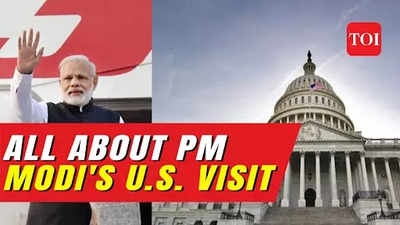
Top Picks For You
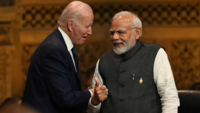
Visual Stories
PM Modi in US Highlights: 900+ Indian-Americans rally in unity march to honour visit
Prime minister narendra modi is visiting the united states from june 21-24 at the invitation of us president joe biden and first lady jill biden. ahead of modi's expected departure today, foreign secretary vinay kwatra shared details on the prime minister's itinerary during a special briefing. his agenda includes a series of high-level meetings on defence cooperation and critical and emerging technologies. catch live updates on prime minister modi's visit to the us with cnbc-tv18 here:.

Advertisement
Supported by
Ukraine Cites Modi Visit as the Fruit of an Emerging Diplomatic Push
Officials say efforts to engage neutral nations like India along with the military incursion into Russia will strengthen Ukraine’s hand in any peace talks.
- Share full article

By Andrew E. Kramer
Reporting from Kyiv, Ukraine
Ukrainian officials are claiming that their military incursion into Russia this month coincides with a flurry of diplomatic overtures that could strengthen Kyiv’s push for wider international backing for its negotiating position in any potential peace talks.
That diplomacy has in part been aimed at engaging neutral nations or those that lean toward Russia, including China and India. And Ukraine cited a planned visit to Kyiv on Friday by Prime Minister Narendra Modi of India as evidence that diplomatic success goes hand in hand with its offensive in Russia.
“It’s important to have diplomatic evidence that the picture is more complicated, and these players also respect Ukraine and engage with Ukraine under these circumstances,” Ukraine’s foreign minister, Dmytro Kuleba, said in an interview, referring to Mr. Modi’s visit. In July, Mr. Kuleba visited China as the Ukrainian military prepared its incursion, expressing support for a Chinese role in a peace process.
Many leaders of countries supporting Ukraine, including President Biden, have ventured to Kyiv during the war. Mr. Modi is the highest profile visit by a leader of a nation with close trade ties with Russia and political neutrality on the war.
Indian officials have said they are not seeking a mediating role but will convey messages between Ukraine and Russia if requested. India is seen as interested in a resolution to the war to avoid further isolation of Russia in the West, which could push Moscow into a closer embrace with China, India’s rival in Asia.
But India has navigated the two combatants in the war carefully. Though Mr. Modi is visiting Ukraine on Friday, he traveled to Moscow earlier this summer, where he was photographed hugging President Vladimir V. Putin on the same day a Russian cruise missile struck a children’s hospital in Ukraine, killing and wounding patients and doctors.
Economically, India has remained an important trading partner for Russia, and has propped up the Russian economy by purchasing discounted oil from companies sanctioned by the European Union and the United States.
At the same time, Mr. Modi earlier in the conflict publicly chastised Russia over the invasion, telling Mr. Putin at a meeting in 2022 that it was “not the time for war.” And now Mr. Modi plans to be in Kyiv even as Ukrainian troops occupy a swath of territory in Russia.
The visit, said Mr. Kuleba, is a “big diplomatic breakthrough” for Kyiv in its effort to press neutral nations to show balance in their relations with the warring countries. He added that Ukraine is not seeking a mediating role by India in potential talks.
Military analysts have been skeptical that Ukraine could hold the territory seized in Russia long enough for it to serve as leverage in any peace negotiations, and no talks are scheduled in any case. Ukraine diverted forces from defending inside the country to attack in Russia, and its defensive lines are now at risk of buckling near the strategic eastern Ukrainian town of Pokrovsk.
But Mr. Kuleba said the attack on Russia, in which several elite military units quickly overran border defenses and seized hundreds of prisoners, has shown that Ukraine can take the initiative, two and a half years after Russia’s full-scale invasion.
“This operation defies perhaps the most widespread argument in the West about stalemate in the war,” he said. “We showed Russia is not as strong as it pretends. And second, we demonstrated there are multiple theaters of war in this conflict.”
Ukraine is pushing the military and diplomatic tracks in parallel, he said.
In the aftermath of Ukraine’s cross-border incursion, Mr. Putin has said he won’t negotiate while Ukrainian troops are on Russian land. But Russia has yielded under pressure in the war before, Mr. Kuleba said, scaling back demands in early rounds of cease-fire talks as Ukraine routed Russia’s invading forces in fighting near the capital, Kyiv, and in negotiating safe passage for grain ships after developing nations objected to rising global food prices.
“Let’s recall that before the large-scale invasion began, and the immediate aftermath, the question sounded slightly different: How long can Ukraine hold against Russia?” he said. “The answer was no more than a week or so. Today, we’re talking about how long Ukraine can hold in the Kursk region. In terms of the war effort, I think it’s a positive change.”
Diplomatically, Ukraine is seeking to win wide international backing for its negotiating stance in any potential talks. In June, Kyiv organized a peace summit in Switzerland that endorsed three confidence building steps in the Ukrainian plan: securing grain exports, safeguarding energy infrastructure and returning civilians deported to Russia.
But those steps represented a scaled-back agenda for Ukraine, emerging after India and other countries made clear they would not sign on to Ukraine’s full 10-point plan. In the end, India attended the summit but did not sign the communiqué, objecting to a diplomatic format that did not include Russia.
India imports Ukrainian grain and agricultural goods, and along with other developing nations felt the pinch of rising food prices when Russia installed a naval blockade of Ukrainian ports. After Moscow withdrew from the pact on grain shipments, Ukraine re-established a shipping channel by attacking Russia’s fleet with exploding sea drones, forcing its ships too far from the Ukrainian coast to enforce a blockade.
But risks remain for food exports that could elevate prices in developing nations.
Mr. Zelensky and Mr. Modi are expected to discuss trade, analysts have said. But the mere presence of the Indian leader in Kyiv is perhaps the more significant development.
Stas Kozljuk contributed reporting from Kyiv, Ukraine, and Suhasini Raj from New Delhi.
Andrew E. Kramer is the Kyiv bureau chief for The Times, who has been covering the war in Ukraine since 2014. More about Andrew E. Kramer
Mobile Menu Overlay
The White House 1600 Pennsylvania Ave NW Washington, DC 20500
Joint Statement from the United States and India
1. President Joseph R. Biden, Jr. and Prime Minister Narendra Modi today affirmed a vision of the United States and India as among the closest partners in the world – a partnership of democracies looking into the 21 st century with hope, ambition, and confidence. The U.S.-India Comprehensive Global and Strategic Partnership is anchored in a new level of trust and mutual understanding and enriched by the warm bonds of family and friendship that inextricably link our countries together. Together, we will build an even stronger, diverse U.S.-India partnership that will advance the aspirations of our people for a bright and prosperous future grounded in respect for human rights, and shared principles of democracy, freedom, and the rule of law. Our cooperation will serve the global good as we work through a range of multilateral and regional groupings – particularly the Quad– to contribute toward a free, open, inclusive, and resilient Indo-Pacific. No corner of human enterprise is untouched by the partnership between our two great countries, which spans the seas to the stars. Charting a Technology Partnership for the Future 2. President Biden and Prime Minister Modi affirm that technology will play the defining role in deepening our partnership. The leaders hailed the inauguration of the Initiative on Critical and Emerging Technology (iCET) in January 2023 as a major milestone in U.S.-India relations. They called on our governments, businesses, and academic institutions to realize their shared vision for the strategic technology partnership. The leaders recommitted the United States and India to fostering an open, accessible, and secure technology ecosystem, based on mutual confidence and trust that reinforces our shared values and democratic institutions. 3. President Biden and Prime Minister Modi set a course to reach new frontiers across all sectors of space cooperation. The leaders applauded our growing cooperation on earth and space science, and space technologies. They welcomed the decision of NASA and ISRO to develop a strategic framework for human spaceflight cooperation by the end of 2023.The leaders hailed the announcement by NASA to provide advanced training to Indian astronauts at the Johnson Space Center in Houston, Texas, with a goal of mounting a joint effort to the International Space Station in 2024.The leaders celebrated the delivery of the NASA-ISRO Synthetic Aperture Radar (NISAR) satellite to ISRO’s U.R. Rao Satellite Centre in Bengaluru, India, and looked forward to NISAR’s 2024 launch from India. Welcoming India’s Space Policy – 2023, the leaders called for enhanced commercial collaboration between the U.S. and Indian private sectors in the entire value chain of the space economy and to address export controls and facilitate technology transfer. President Biden deeply appreciated India’s signing of the Artemis Accords, which advance a common vision of space exploration for the benefit of all humankind. 4. President Biden and Prime Minister Modi committed their administrations to promoting policies and adapting regulations that facilitate greater technology sharing, co-development, and co-production opportunities between U.S. and Indian industry, government, and academic institutions. The leaders welcomed the launch of the interagency-led Strategic Trade Dialogue in June2023 and directed both sides to undertake regular efforts to address export controls, explore ways of enhancing high technology commerce, and facilitate technology transfer between the two countries. 5. President Biden and Prime Minister Modi hailed the signing of an MoU on Semiconductor Supply Chain and Innovation Partnership as a significant step in the coordination of our countries’ semiconductor incentive programs. This will promote commercial opportunities, research, talent, and skill development. The leaders welcomed an announcement by Micron Technology, Inc., to invest up to $825 million to build a new semiconductor assembly and test facility in India with support from the Indian government. The combined investment valued at $2.75 billion would create up to 5,000 new direct and 15,000 community jobs opportunities in the next five years. The leaders also welcomed Lam Research’s proposal to train 60,000 Indian engineers through its Semiverse Solution virtual fabrication platform to accelerate India’s semiconductor education and workforce development goals, and an announcement by Applied Materials, Inc., to invest $400 million to establish a collaborative engineering center in India. 6. President Biden and Prime Minister Modi share a vision of creating secure and trusted telecommunications , resilient supply chains, and enabling global digital inclusion. To fulfill this vision, the leaders launched two Joint Task Forces on advanced telecommunications, focused on Open RAN and research and development in 5G/6G technologies. Public-private cooperation between vendors and operators will be led by India’s Bharat 6G Alliance and the U.S. Next G Alliance. We are partnering on Open RAN field trials and rollouts, including scaled deployments, in both countries with operators and vendors of both markets, backed by U.S. International Development Finance Corporation (DFC) financing. The leaders welcomed participation of Indian companies in the U.S. Rip and Replace Program. They endorsed an ambitious vision for 6G networks, including standards cooperation, facilitating access to chipsets for system development, and establishing joint research and development projects. President Biden and Prime Minister Modi also stressed the need to put in place a “Trusted Network/Trusted Sources” bilateral framework. 7. President Biden and Prime Minister Modi welcomed the establishment of a joint Indo-U.S. Quantum Coordination Mechanism to facilitate collaboration among industry, academia, and government, and our work toward a comprehensive Quantum Information Science and Technology agreement. The United States welcomes India’s participation in the Quantum Entanglement Exchange and in the Quantum Economic Development Consortium to facilitate expert and commercial exchanges with leading, like-minded quantum nations. The United States and India will sustain and grow quantum training and exchange programs and work to reduce barriers to U.S.-India research collaboration. The leaders welcomed the launch of a $2million grant program under the U.S.-India Science and Technology Endowment fund for the joint development and commercialization of Artificial Intelligence (AI) and quantum technologies, and encouraged public-private collaborations to develop high performance computing (HPC) facilities in India. President Biden also reiterated his government’s commitment to work with U.S. Congress to lower barriers to U.S. exports to India of HPC technology and source code. The U.S. side pledged to make its best efforts in support of India’s Center for Development of Advanced Computing (C-DAC) joining the U.S. Accelerated Data Analytics and Computing (ADAC) Institute. 8. The leaders welcomed 35 innovative joint research collaborations in emerging technologies funded by the U.S. National Science Foundation (NSF) and the Indian Department of Science and Technology (DST). Under a new implementation arrangement between NSF and DST, both sides will fund joint research projects in computer and information science and engineering, cyber physical systems, and secure and trustworthy cyberspace. Furthermore, NSF and India’s Ministry of Electronics and Information Technology will bring fresh funding for joint projects in applied research areas such as semiconductors, next generation communication, cyber security, sustainability and green technologies and intelligent transportation systems. 9. Both President Biden and Prime Minister Modi acknowledge the profound opportunities and significant risks associated with AI. Accordingly, they committed to develop joint and international collaboration on trustworthy and responsible AI, including generative AI, to advance AI education and workforce initiatives, promote commercial opportunities, and mitigate against discrimination and bias. The United States also supports India’s leadership as Chair of the Global Partnership on AI. The leaders applauded Google’s intent to continue investing through its $10 billion India Digitization Fund, including in early-stage Indian startups. Through its AI Research Center in India, Google is building models to support over 100 Indian languages. 10. President Biden and Prime Minister Modi hailed our deepening bilateral cooperation on cutting-edge scientific infrastructure, including a $140 million in-kind contribution from the Indian Department of Atomic Energy (DAE) to the U.S. Department of Energy’s (DOE’s) Fermi National Laboratory toward collaborative development of the Proton Improvement Plan-II Accelerator, for the Long Baseline Neutrino Facility — the first and largest international research facility on U.S. soil. They also welcomed the commencement of construction of a Laser Interferometer Gravitational-Wave Observatory (LIGO) in India. The leaders called on their administrations to extend these partnerships to advanced biotechnology and biomanufacturing, and enhance biosafety and biosecurity innovation, practices, and norms. Powering a Next Generation Defense Partnership 11. The U.S.-India Major Defense Partnership has emerged as a pillar of global peace and security. Through joint exercises, strengthening of defense industrial cooperation, the annual “2+2” Ministerial Dialogue, and other consultative mechanisms, we have made substantial progress in building an advanced and comprehensive defense partnership in which our militaries coordinate closely across all domains. The leaders appreciated the strong military-to-military ties, mutual logistics support, and efforts to streamline implementation of foundational agreements. They noted that information sharing and placement of Liaison Officers in each other’s military organizations will spur joint service cooperation. They also reiterated their resolve to strengthen maritime security cooperation, including through enhanced underwater domain awareness. The leaders welcomed the launch of dialogues in new defense domains including space and AI, which will enhance capacity building, knowledge, and expertise. 12. Expressing their desire to accelerate defense industrial cooperation, the leaders welcomed the adoption of a Defense Industrial Cooperation Roadmap, which will provide policy direction to defense industries and enable co-production of advanced defense systems and collaborative research, testing, and prototyping of projects. Both sides are committed to addressing any regulatory barriers to defense industrial cooperation. The leaders also noted the decision of India’s Ministry of Defense and the U.S. Department of Defense to commence negotiations for concluding a Security of Supply arrangement and initiate discussions about Reciprocal Defense Procurement agreement. 13. President Biden and Prime Minister Modi hailed the landmark signing of an MoU between General Electric and Hindustan Aeronautics Limited for the manufacture of GE F-414 jet engines in India, for the Hindustan Aeronautics Limited Light Combat Aircraft Mk 2. This trailblazing initiative to manufacture F-414 engines in India will enable greater transfer of U.S. jet engine technology than ever before. The leaders committed their governments to working collaboratively and expeditiously to support the advancement of this unprecedented co-production and technology transfer proposal. 14. President Biden and Prime Minister Modi also welcomed India’s emergence as a hub for maintenance and repair for forward deployed U.S. Navy assets and the conclusion of Master Ship Repair Agreements with Indian shipyards. This will allow the U.S. Navy to expedite the contracting process for mid-voyage and emergent repair. As envisaged in the Defense Industrial Roadmap, both countries agree to work together for the creation of logistic, repair, and maintenance infrastructure for aircrafts and vessels in India. 15. The leaders welcomed the setting up and launch of the U.S.-India Defense Acceleration Ecosystem (INDUS-X). As a network of universities, startups, industry and think tanks, INDUS-X will facilitate joint defense technology innovation, and co-production of advanced defense technology between the respective industries of the two countries. The U.S. Department of Defense’s Space Force has signed its first International Cooperative Research and Development Agreement with Indian start-up 114 AI and 3rdiTech. Both companies will work with General Atomics to co-develop components using cutting edge technologies in AI and semiconductors respectively. 16. President Biden and Prime Minister Modi welcomed India’s plans to procure General Atomics MQ-9B HALE UAVs. The MQ-9Bs, which will be assembled in India, will enhance the ISR capabilities of India’s armed forces across domains. As part of this plan, General Atomics will also establish a Comprehensive Global MRO facility in India to support of India’s long-term goals to boost indigenous defense capabilities. Catalyzing the Clean Energy Transition 17. As climate action and clean energy leaders, the United States and India share a common and ambitious vision to rapidly deploy clean energy at scale, build economic prosperity, and help achieve global climate goals. They recognize the critical role of the U.S. Inflation Reduction Act and India’s ambitious production-linked incentives scheme for cutting-edge clean and renewable technologies. The leaders highlighted the U.S.-India Climate and Clean Energy Agenda 2030 Partnership and Strategic Clean Energy Partnership (SCEP) as reflective of this commitment. The leaders welcomed joint efforts to develop and deploy energy storage technologies, including through the establishment of a new task force under SCEP. The leaders welcomed the launch of the U.S.-India New and Emerging Renewable Energy Technologies Action Platform, which will accelerate cooperation in green hydrogen, offshore and onshore wind, and other emerging technologies. They will collaborate to achieve their respective national goals to reduce the cost of green/clean hydrogen under India’s National Green Hydrogen Mission and the U.S. Hydrogen Energy Earthshot. The United States welcomed India’s decision to co-lead the multilateral Hydrogen Breakthrough Agenda. The leaders called for the development of joint efforts in carbon capture, utilization, and storage, given its role in reducing emissions. The leaders welcomed India’s VSK Energy LLC’s announcement to invest up to $1.5 billion to develop a new, vertically integrated solar panel manufacturing operation in the United States and India’s JSW Steel USA’s plans to invest $120 million at its Mingo Junction, Ohio, steel plant to better serve growing markets in the renewable energy and infrastructure sectors. 18. President Biden and Prime Minister Modi underscored the importance of decarbonizing the transportation sector, including by accelerating the deployment of zero emissions vehicles, continued collaboration to promote public and private financing for electric transportation, and the development of biofuels, including sustainable aviation fuels. To this end, the leaders lauded the creation and development of the Global Biofuels Alliance, which will be launched in July 2023, with the United States as a founding member. Both leaders welcomed the signing of an MOU under which the U.S. Agency for International Development will support Indian Railways’ ambitious target to become a “net-zero” carbon emitter by 2030.The United States and India also announced plans to create a payment security mechanism that will facilitate the deployment of 10,000 made-in-India electric buses in India, augmenting India’s focused efforts in reducing greenhouse gas emissions, improving public health, and diversifying the global supply chain. 19. India and the United States committed to create innovative investment platforms that will effectively lower the cost of capital and attract international private finance at scale to accelerate the deployment of greenfield renewable energy, battery storage, and emerging green technology projects in India. The United States and India will endeavor to develop a first-of-its kind, multibillion-dollar investment platform aimed at providing catalytic capital and de-risking support for such projects. 20. President Biden and Prime Minister Modi reaffirmed their support for the mission of the International Energy Agency (IEA), and President Biden pledged to continue working with the Government of India, IEA members, the IEA Secretariat, and other relevant stakeholders toward IEA membership for India in accordance with the provisions of the Agreement on an International Energy Program. 21. President Biden and Prime Minister Modi affirmed the intention of the two governments, as trusted partners, to work together to ensure that our respective markets are well-supplied with the essential critical minerals needed to achieve our climate, economic and strategic technology cooperation goals. The leaders pledged to hasten bilateral collaboration to secure resilient critical minerals supply chains through enhanced technical assistance and greater commercial cooperation, and exploration of additional joint frameworks as necessary. The United States enthusiastically welcomes India as the newest partner in the Mineral Security Partnership (MSP), to accelerate the development of diverse and sustainable critical energy minerals supply chains globally while agreeing to the principles of the MSP including environmental, social, and governance standards. The leaders lauded the announcement of India’s Epsilon Carbon Limited’s plans toinvest $650 million in a U.S. greenfield electric vehicle battery component factory. 22. President Biden and Prime Minister Modi underscored the important role nuclear energy plays in global decarbonization efforts and affirmed nuclear energy as a necessary resource to meet our nations’ climate, energy transition, and energy security needs. The leaders noted ongoing negotiations between the Nuclear Power Corporation of India Limited (NPCIL) and Westinghouse Electric Company (WEC) for the construction of six nuclear reactors in India. They welcomed intensified consultations between the U.S. DOE and India’s DAE for facilitating opportunities for WEC to develop a techno-commercial offer for the Kovvada nuclear project. They also noted the ongoing discussion on developing next generation small modular reactor technologies in a collaborative mode for the domestic market as well as for export. The United States reaffirms its support for India’s membership in the Nuclear Suppliers Group and commits to continue engagement with likeminded partners to advance this goal. 23. The leaders recognize that addressing sustainable consumption and production is a key component to achieving of the development, environment and climate ambitions of the 2030 Agenda for Sustainable Development and the SDGs. In this regard, President Biden welcomed Prime Minister Modi’s Lifestyle for Environment initiative (LiFE) as a successful national model to address the impacts of climate change, biodiversity loss, desertification and land degradation, and resolved to work together to implement the G20 High Level Principles on Lifestyles for Sustainable Development. Deepening Strategic Convergence 24. As global partners, the United States and India affirm that the rules-based international order must be respected. They emphasized that the contemporary global order has been built on principles of the UN Charter, international law, and respect for sovereignty and territorial integrity of states. 25. President Biden and Prime Minister Modi expressed their deep concern over the conflict in Ukraine and mourned its terrible and tragic humanitarian consequences. The leaders underscored the serious and growing impacts of the war on the global economic system, including on food, fuel and energy security, and critical supply chains. They called for greater efforts to mitigate the consequences of the war, especially in the developing world. Both countries further pledge to render continuing humanitarian assistance to the people of Ukraine. They called for respect for international law, principles of the UN charter, and territorial integrity and sovereignty. Both countries concurred on the importance of post-conflict reconstruction in Ukraine. 26. The United States and India reaffirmed their resolve to counter any attempts to unilaterally subvert the multilateral system. The leaders underscored the need to strengthen and reform the multilateral system so it may better reflect contemporary realities. In this context both sides remain committed to a comprehensive UN reform agenda, including through expansion in permanent and non-permanent categories of membership of the UN Security Council. Sharing the view that global governance must be more inclusive and representative, President Biden reiterated U.S. support for India’s permanent membership on a reformed UN Security Council(UNSC). In this context, President Biden welcomed India’s candidature as a non-permanent member of the UNSC for the 2028-29 term, in view of India’s significant contributions to the UN system and commitment to multilateralism, as well as its active and constructive engagement in the Inter-Governmental Negotiations process on Security Council reforms, with an overall objective of making the UNSC more effective, representative, and credible. 27. President Biden and Prime Minister Modi recommitted themselves to empowering the Quad as a partnership for global good. The two leaders welcomed the progress made at the Hiroshima Summit last month among the four maritime democracies to further advance a positive and constructive agenda for peace and prosperity in the Indo-Pacific. The leaders welcomed progress on the Indo-Pacific Partnership for Maritime Domain Awareness, through which Quad partners are providing maritime domain data across the Indian Ocean, Southeast Asia, and the Pacific regions. The Quad to be hosted in India in 2024 would be another opportunity to continue the dialogue and consolidate cooperation. The leaders committed to continue working in partnership with regional platforms such as the Indian Ocean Rim Association, Indo-Pacific Oceans Initiative, and ASEAN to achieve shared aspirations and address shared challenges in the Indo-Pacific Region. Prime Minister Modi welcomed the United States joining the Indo-Pacific Oceans Initiative and President Biden welcomed India’s continued participation as an observer in the Partners in the Blue Pacific. 28. The leaders also welcomed the depth and pace of enhanced consultations between the two governments on regional issues including South Asia, the Indo-Pacific and East Asia and looked forward to our governments holding an inaugural Indian Ocean Dialogue in 2023. 29. President Biden and Prime Minister Modi reiterated their enduring commitment to a free, open, inclusive, peaceful, and prosperous India-Pacific region with respect for territorial integrity and sovereignty, and international law. Both leaders expressed concern over coercive actions and rising tensions, and strongly oppose destabilizing or unilateral actions that seek to change the status quo by force. Both sides emphasized the importance of adherence to international law, particularly as reflected in the United Nations Convention on the Law of the Sea (UNCLOS), and the maintenance of freedom of navigation and overflight, in addressing challenges to the maritime rules-based order, including in the East and South China Seas. 30. The leaders expressed deep concern about the deteriorating situation in Myanmar, and called for the release of all those arbitrarily detained, the establishment of constructive dialogue, and the transition of Myanmar toward an inclusive federal democratic system. 31. The leaders also condemned the destabilizing ballistic missile launches of the Democratic People’s Republic of Korea (DPRK), which violate relevant UN Security Council resolutions and pose a grave threat to international peace and security. They reaffirmed their commitment to the complete denuclearization of the Korean Peninsula and urged DPRK to comply with its obligations under these resolutions and engage in substantive dialogue. They stressed the importance of addressing the concerns regarding DPRK’s proliferation linkages related to weapons of mass destruction, their means of delivery, and related items in the region and beyond.
32. The United States and India stand together to counter global terrorism and unequivocally condemn terrorism and violent extremism in all its forms and manifestations. President Biden and Prime Minister Modi reiterated the call for concerted action against all UN-listed terrorist groups including Al-Qa’ida, ISIS/Daesh, Lashkar e-Tayyiba (LeT), Jaish-e-Mohammad (JeM), and Hizb-ul-Mujhahideen. They strongly condemned cross-border terrorism, the use of terrorist proxies and called on Pakistan to take immediate action to ensure that no territory under its control is used for launching terrorist attacks. They called for the perpetrators of the 26/11 Mumbai and Pathankot attacks to be brought to justice. They noted with concern the increasing global use of unmanned aerial vehicles (UAVs), drones and information and communication technologies for terrorist purposes and reaffirmed the importance of working together to combat such misuse. They welcomed the cooperation between our two governments on counterterrorism designations and homeland security cooperation, including in intelligence sharing and law enforcement cooperation, and called upon the Financial Action Task Force to undertake further work identifying how to improve global implementation of its standards to combat money laundering and the financing of terrorism. 33. The leaders reiterated their strong support for a peaceful, secure, and stable Afghanistan.They discussed the current humanitarian situation and concurred on the need to continue to provide immediate humanitarian assistance to the people of Afghanistan. The leaders urged the Taliban to abide by UNSC Resolution 2593 which demands that Afghan territory should never be used to threaten or attack any country, shelter or train terrorists, or plan or finance terrorist attacks. Committing to continue close consultations on the situation in Afghanistan, the leaders emphasized the importance of formation of an inclusive political structure and called on the Taliban to respect the human rights of all Afghans, including women and girls, and to respect freedom of movement.
34. President Biden and Prime Minister Modi looked forward to strengthening a long-term strategic partnership between the I2U2 countries of India, Israel, United Arab Emirates, and the United States to leverage markets to build more innovative, inclusive, and science-based solutions to enhance food and energy security, improve movement of people and goods across hemispheres, and increase sustainability and resilience.
35. President Biden and Prime Minister Modi reaffirmed their countries’ commitment to an open, secure, inclusive, safe, interoperable, and reliable Internet, and to continuing cooperation on a range of cybersecurity issues, including preventing and responding to cyber threats, promoting cybersecurity education and awareness and measures to build resilient cyber infrastructure. Both the United States and India are committed to sharing information about cyber threats and vulnerabilities, and to working together to investigate and respond to cyber incidents. 36. The United States and India reaffirm and embrace their shared values of freedom, democracy, human rights, inclusion, pluralism, and equal opportunities for all citizens. Both countries have a tradition of recognizing the diversity represented in their nations and celebrating the contributions of all their citizens. They reasserted that democracy, freedom, and rule of law are the shared values that anchor global peace and sustainable development. In keeping with the spirit of leaving no one behind, both leaders committed to working towards ensuring that fruits of economic growth and well-being reach the underprivileged. They also committed to pursue programs and initiatives that would facilitate women-led development, and enable all women and girls to live free from gender-based violence and abuse. President Biden underscored his appreciation for India’s participation in the Summit for Democracy process, and for efforts made by India toward sharing knowledge, technical expertise, and experiences with electoral management bodies of other democracies. The leaders also welcomed the re-launch of the Global Issues Forum, which would hold its next meeting at an appropriate time. Propelling Global Growth 37. As two of the world’s largest democratic economies, the United States and India are indispensable partners in advancing global prosperity and a free, fair, and rules-based economic order. President Biden highlighted the impactful participation of Prime Minister Modi in the G7 Hiroshima Summit and looks forward to the G20 Summit in September in New Delhi. He applauded India’s leadership in its ongoing G20 Presidency, which has brought renewed focus on strengthening multilateral institutions and international cooperation to tackle global challenges such as climate change, pandemics, fragility and conflict, along with work to accelerate achievement of the UN Sustainable Development Goals, and lay the foundation for strong, sustainable, balanced, and inclusive growth. 38. President Biden and Prime Minister Modi are united in their determination to use the G20 to deliver on shared priorities for the G20 Leaders’ Summit, including improving the sovereign debt restructuring process; advancing the multilateral development bank evolution agenda, including mobilizing new concessional financing at the World Bank to support all developing countries; and raising the level of ambition on mobilizing private sector investment for quality, sustainable, and resilient infrastructure, including through the Partnership for Global Infrastructure and Investment. The United States looks forward to hosting the G20 presidency in 2026, nearly two decades after the first full-scale G20 Leaders’ Summit in Pittsburgh. 39. The United States and India recognize the potential of Digital Public Infrastructure (DPI) approaches for enabling open and inclusive digital economies. President Biden and Prime Minister Modi intend to work together to provide global leadership for the implementation of DPI to promote inclusive development, competitive markets, and protect individual rights. In this regard, the United States and India will explore how to partner together and align our efforts to advance the development and deployment of robust DPIs, including appropriate safeguards to protect, privacy, data security and intellectual property. They will explore developing a U.S.-India Global Digital Development Partnership, which would bring together technology and resources from both countries to enable development and deployment of DPIs in developing countries. 40. The leaders are committed to pursuing ambitious efforts to strengthen Multilateral Development Banks (MDBs) to address shared global challenges of the 21 st century. In this regard, they emphasized the need for comprehensive efforts by MDBs to evolve their vision, incentive structure, operational approaches and financial capacity so that they are better equipped to address a wide range of SDGs and trans-boundary challenges including climate change, pandemics, conflicts and fragility. Recognizing multilateral efforts in this area, the leaders acknowledged the ongoing work under the Indian presidency of the G20 on strengthening MDBs including the report of the G20 Expert Group on Strengthening MDBs. By the G20 Leaders’ Summit in New Delhi, the United States and India will work together to secure G20 commitment to create a major new dedicated pool of funds at the World Bank to deploy concessional lending for global challenges, and to enhance support for crisis response in International Development Association recipient countries. 41. The leaders reaffirmed that the Indo-Pacific Economic Framework (IPEF) is an important pillar of our collective and collaborative efforts to build resilience in our supply chains, harness transformations in clean energy, and accelerate progress of our economies through anti-corruption efforts, efficient tax administrative practices, and capacity building measures. The leaders welcomed the substantial conclusion of negotiations on the proposed IPEF Supply Chain Agreement and committed to working with other partners expeditiously to conclude negotiations of the agreements under the clean economy and fair economy pillars to deliver concrete benefits that enhance the economic competitiveness and prosperity of countries in the Indo-Pacific. President Biden invited India to attend the APEC Summit in San Francisco in November 2023 as a guest of the host. 42. The U.S.-India trade and investment partnership is an engine for global growth, with bilateral trade exceeding $191 billion in 2022, nearly doubling from 2014. The leaders applauded the reconvening of the U.S.-India Commercial Dialogue and CEO Forum in March in New Delhi. They encouraged respective industries to take action on the recommendations from the CEOs for greater engagement and technical cooperation to build resilient supply chains for emerging technologies, clean energy technologies, and pharmaceuticals; promote an innovative digital economy; lower barriers to trade and investment; harmonize standards and regulations wherever feasible; and work towards skilling our workforces. The leaders support continued active engagement between the U.S. Treasury Department and the Indian Ministry of Finance under the Economic and Financial Partnership dialogue. They encouraged the U.S. Federal Insurance Office and the Insurance Regulatory and Development Authority of India to advance areas of mutual interest in the insurance sector under their existing MoU framework. 43. The United States and India have also taken steps toward deepening bilateral cooperation to strengthen our economic relationship, including trade ties. Underscoring the willingness and trust of both countries in resolving trade issues, the leaders welcomed the resolution of six outstanding WTO disputes between the two countries through mutually agreed solutions as well as their understandings on market access related to certain products of significance to the bilateral trade relationship. They also looked forward to reconvening the India-U.S. Trade Policy Forum before the end of 2023 to further enhance the bilateral trade relationship by addressing trade concerns and identifying further areas for engagement. India highlighted its interest in the restoration of its status under the U.S. Generalized System of Preferences program, which could be considered in relation to eligibility criteria determined by the U.S. Congress. The leaders supported intensifying the work to advance progress on issues related to the eligibility criteria. Prime Minister Modi also expressed India’s interest towards being recognized as a Trade Agreements Act-designated country by the United States to further enhance the integration of both economies and to further promote trade and investment between two countries. In this regard, the leaders welcomed the initiation of discussions between both sides at an official level on issues related to bilateral government procurement. 44. The leaders welcomed focused efforts under the re-launched U.S.-India Commercial Dialogue to expand cooperation in the areas of Talent, Innovation, and Inclusive Growth. President Biden expressed appreciation for the significant workforce development efforts undertaken by several of the Indian companies taking part in the U.S.-India CEO Forum to upskill more than 250,000 employees and promote STEM learning within local communities across the United States. Both leaders applauded the concept of an “Innovation Handshake” under the Commercial Dialogue that will lift up and connect the two sides’ dynamic startup ecosystems, address specific regulatory hurdles to cooperation, and promote further innovation and job growth, particularly in emerging technologies. The Innovation Handshake demonstrates the resolve on both sides to further bolster their shared vision of an elevated strategic technology partnership, leveraging the strength and ingenuity of their respective private sectors to identify new innovations and match them with industry requirements across the priority sectors identified under the iCET framework. 45. Recognizing the essential role that micro, small and medium-sized enterprises (MSMEs) play in advancing inclusive growth, expanding exports, and boosting employment across our respective cities, towns, and rural areas, the leaders welcomed plans under the Commercial Dialogue to organize a forum to promote the role and scope of MSMEs in bilateral trade and a digital commerce showcase to strengthen the engagement of women-owned and rural enterprises in particular. They commended the work of the U.S. Small Business Administration and the Indian Ministry of Micro, Small and Medium Enterprises, which are pursuing increased cooperation and intend to formalize their work through a MoU to support entrepreneurs and MSMEs. 46. President Biden and Prime Minister Modi again welcomed Air India’s historic agreement with Boeing to acquire more than 200 American-made aircraft. This purchase will support more than one million American jobs across 44 states and contribute to ongoing efforts to modernize the civil aviation sector in India. Boeing has announced a $100 million investment on infrastructure and programs to train pilots in India, supporting India’s need for 31,000 new pilots over the next 20 years. The leaders also welcomed Boeing’s announcement of its completion of a C-17 aftermarket support facility for MRO and a new parts logistics center in India to capture future synergies between defense and civil aviation. Empowering Future Generations and Protecting the Health of our People 47. President Biden and Prime Minister hailed the growing bilateral education partnership between the United States and India. Indian students are on pace to soon become the largest foreign student community in the United States, with an increase of nearly 20 percent in Indian students studying in the United States last year alone. The leaders welcomed the establishment of a new Joint Task Force of the Association of American Universities and leading Indian educational institutions, including the Indian Institutes of Technology, and the nomination of councils on each side, and noted their interim recommendations for expanding research and university partnerships between the two countries. They also welcomed the establishment of Indo-U.S. Global Challenge Institutes to spark deeper research partnerships and people-to-people exchanges between a range of diverse institutions in the U.S. and India in semiconductors, sustainable agriculture, clean energy, health and pandemic preparedness, and emerging technologies. 48. The leaders welcomed an announcement by the U.S. Department of State that it would launch a pilot to adjudicate domestic renewals of certain petition-based temporary work visas later this year, including for Indian nationals, with the intent to implement this for an expanded pool of H1B and L visa holders in 2024 and eventually broadening the program to include other eligible categories. 49. The leaders affirmed that the movement of professional and skilled workers, students, investors and business travelers between the countries contributes immensely to enhancing bilateral economic and technological partnership. While acknowledging the important steps taken to augment processing of visa applications, they noted the pressing need to further expedite this process. The leaders also directed officials to identify additional mechanisms to facilitate travel for business, tourism, and professional and technical exchanges between the two countries. 50. Concomitant with the rapid growth in our strategic partnership and demand for travel, both sides intend to open new consulates in each other’s countries. The United States intends to initiate the process to open two new consulates in India in the cities of Bengaluru and Ahmedabad. India will take steps to operationalize its new consulate in Seattle later this year, and open two new consulates at jointly identified locations in the United States. 51. The leaders recognized the role of asocial security totalization agreement in protecting the interests of cross border workers and reaffirmed the intent to continue ongoing discussions concerning the elements required in both countries to enter into a bilateral social security totalization agreement. 52. President Biden and Prime Minister Modi celebrate the historic and active collaboration across the full expanse of our respective health sectors. They welcomed the opportunity for deeper collaboration to secure pharmaceutical supply chains. The leaders encouraged their administrations to continue their strong collaboration on pandemic preparedness, supported by epidemiology training; laboratory strengthening and point of entry surveillance; and food safety and regulation. The leaders applauded collaborations between research institutes of both countries on affordable cancer technology programs, including for the development of AI enabled diagnostic and prognosis prediction tools, and on diabetes research. The leaders committed to holding a U.S.-India Cancer Dialogue, hosted by President Biden’s Cancer Moonshot, to bring experts together from both countries to identify concrete areas of collaboration to accelerate the rate of progress against cancer. They also called for expanded collaboration on digital health platforms including responsible use of cutting-edge technologies like AI, and to explore cooperation in research and the use of traditional medicine. President Biden lauded Prime Minister Modi’s plan to eliminate tuberculosis in India by 2025, five years ahead of the target set by the UN’s sustainable development goals, hailing it as a big step forward that will inspire other countries to action. 53. President Biden and Prime Minister Modi welcomed the opportunity for deeper collaboration to secure, de-risk, and strengthen pharmaceutical supply chains, with a focus on active pharmaceutical ingredients, key starting materials, and key vaccine input materials. They also underscored the need for strengthening global collaboration network on research and development in medical countermeasures, vaccines, therapeutics and diagnostics to promote access to safe, effective, and innovative medical products in an affordable manner. 54. President Biden and Prime Minister Modi committed to work toward a broader and deeper bilateral drug policy framework for the 21 st century. Under this framework, both countries aspire to expand cooperation and collaboration to disrupt the illicit production and international trafficking of illicit drugs, including synthetic drugs, such as fentanyl and Amphetamine Type Stimulants and illicit use of their Precursors. Toward this end, they committed to a holistic public health partnership to prevent and treat illicit drug use, address workforce shortages and skilling requirements, and showcase a secure, resilient, reliable and growing pharmaceutical supply chain as a model for the world. 55. Prime Minister Modi conveyed his deep appreciation for the repatriation of antiquities to India by the United States. Both sides expressed strong interest in working quickly toward a Cultural Property Agreement, which would help to prevent illegal trafficking of cultural property from India and enhance cooperation on the protection and lawful exchange of cultural property. 56. The Leaders welcomed the establishment of the Tamil Studies Chair at the University of Houston and reinstating the Vivekananda Chair at the University of Chicago to further research and teaching of India’s history and culture. 57. Prime Minister Modi looked forward to the visit of President Biden to the G20 Leaders’ Summit in New Delhi in September 2023. 58. Taken together, the leaders today affirmed that this document, in its breadth and depth, represents the most expansive and comprehensive vision for progress in the history of our bilateral relationship. Still, our ambitions are to reach ever greater heights, and we commit both our governments and our peoples to this endeavor, now and into the future.
Stay Connected
We'll be in touch with the latest information on how President Biden and his administration are working for the American people, as well as ways you can get involved and help our country build back better.
Opt in to send and receive text messages from President Biden.
- Latest News
- Emergencies
- Environment
- Ask the Law
- Visa+Immigration
- Phone+Internet
- Reader Queries
- Safety+Security
- Banking & Insurance
- Corporate Tax
- Travel & Tourism
- Corporate News
- Electronics
- Home and Kitchen
- Consumables
- Saving and Investment
- Budget Living
- Expert Columns
- Community Tips
- Cryptocurrency
- Cooking and Cuisines
- Guide to Cooking
- Art & People
- Friday Partner
- Daily Crossword
- Word Search
- Philippines
- Australia-New Zealand
- Corrections
- Special Reports
- Pregnancy & Baby
- Learning & Play
- Child Health
- For Mums & Dads
- UAE Success Stories
- Photos & Videos
- Course Reviews
- Learn to Play
- Schedule | Medal Tally
- South Indian
- Health+Fitness
- Best Of Bollywood
- Entertainment
- Special Features
- Gratuity Calculator
- Notifications
- Prayer Times
Modi says ‘firmly for peace’ on historic Ukraine visit
India PM pledges humanitarian support for Kyiv, signs deals in agriculture, culture
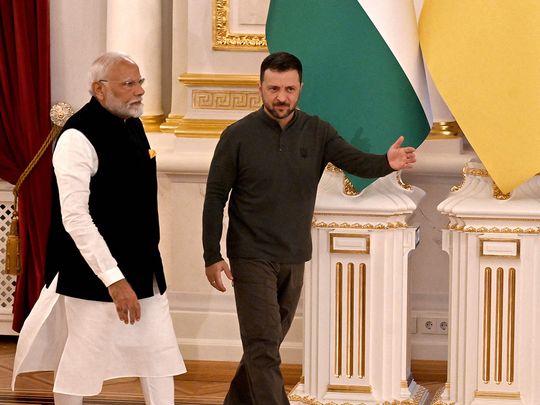
Kyiv: Indian Prime Minister Narendra Modi used his first visit to Kyiv on Friday to again call for a diplomatic solution to more than two years of war with Russia, saying he stood “firmly for peace” in talks with President Volodymyr Zelensky.
Modi was in Kyiv just over a month after angering Ukraine by hugging President Vladimir Putin during a meeting in Moscow.
Arriving for talks on Friday, he embraced Zelensky and the pair held a minute of silence at a memorial commemorating children killed in Russia’s attack.
New Delhi, which has avoided explicit condemnation of Moscow’s attack, has cast itself as a possible peacemaker between the warring neighbours.
“We were not neutral from day one, we have taken a side, and we stand firmly for peace,” he told Zelensky.
He earlier said that “no problem should be solved on the battlefield.”
His visit comes as Kyiv’s forces are mounting a major incursion into Russia’s Kursk region, while Moscow’s army is advancing in eastern Ukraine.
The Indian leader pledged humanitarian support for Kyiv, saying: “Whatever help is required from a humanitarian standpoint, India will always stand with you.”
Zelensky called Modi’s visit a “historic moment”.
But neither side showed signs of a breakthrough, with India’s foreign minister Subrahmanyam Jaishankar later saying that it was “clearly a complex issue” and that India believes Moscow should be involved if peace efforts were to progress.
India took part in a Kyiv-led international peace summit in June, but Jaishankar said that “productive (talks) will naturally have to involve the other party concerned.”
‘Truly heartbreaking’
As Modi arrived in Kyiv, Ukraine said that Russian strikes had killed eight civilians in several regions.
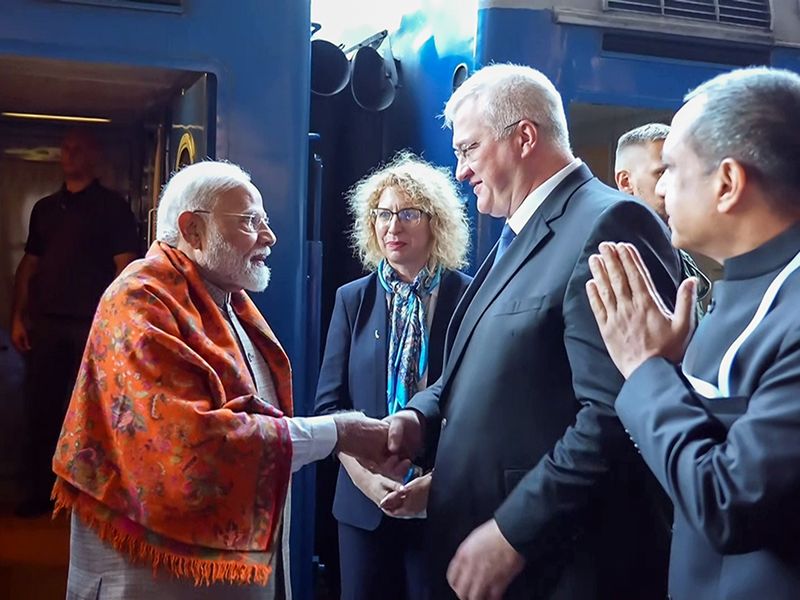
Modi began his visit by accompanying Zelensky to an exhibit commemorating children killed in the war.
“I realised that the first casualty of war is in fact innocent children,” Modi said. “And that is truly heartbreaking.”
Jaishankar said the pair held “very open and in many ways constructive talks” and that Modi had invited Zelensky to India.
He said New Delhi is willing to do “whatever we can because we think that the continuation of this conflict is terrible for Ukraine and the world.”
India has not joined in UN sanctions over the attack and is a major buyer of Russian oil.
Jaishankar said it was not in line with the country’s “political-diplomatic history” to impose sanctions on countries.
Indian diplomacy
But Russia’s Ukraine attack has also put some strain on relations between India and Russia.
In the first year of the attack in 2022, Putin publicly acknowledged that Modi had “concerns” over Moscow’s actions in Ukraine.
India has also been angry at Moscow over reports of several Indian citizens dying in Ukraine after being enlisted with Russian forces.
Western powers have in recent years pressured New Delhi to distance itself from Russia.
Modi’s visit came more than two weeks into Ukraine’s surprise incursion into Russia’s Kursk region.
Jaishankar said the incursion came up in conversation between Zelensky and Modi, but did not elaborate.
Ukraine has said one of the aims of launching its surprise offensive into the Kursk region on August 6 was to force Moscow into “fair” negotiations.
While there was no sign of any serious talks to end the war before then, Russia has said the counter-offensive now makes them impossible.
Putin earlier this year said Kyiv would have to abandon territory in four of its regions which Moscow claims to have annexed as a precondition to opening talks - a hardline demand that drew scorn in Kyiv and the West.
Zelensky has also ruled out direct negotiations with Putin.
Even as Moscow scrambles to fight off the Ukrainian attack into its western Kursk region, its forces are still advancing in the Donetsk region of eastern Ukraine, capturing several towns and villages in recent days.
Kyiv has ordered some evacuations from Pokrovsk - a key strategic and logistics hub in the region - amid fears it could fall to Russia.
Deals signed
Modi and Zelensky signed several documents during the former’s visit to Kyiv in sectors including agriculture, food industry, medical products regulation and cultural cooperation, reports ANI.
The two leaders witnessed the signing of four agreements. These include the Agreement on Cooperation in the field of Agriculture and Food Industry; MoU on Cooperation in the field of Medical Products Regulation; MoU on Indian Humanitarian Grant Assistance for Implementation of High Impact Community Development Projects; and Programme for Cultural Cooperation for 2024-2028, a press release by India’s Ministry of External Affairs said.
More From India
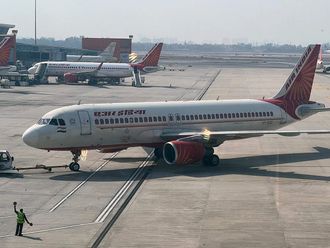
Air India fined Rs9m for flying with non-qualified crew
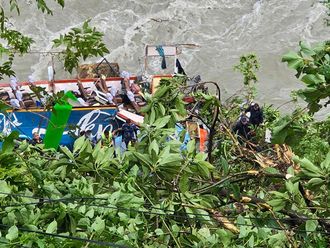
14 killed after bus from India falls in river in Nepal
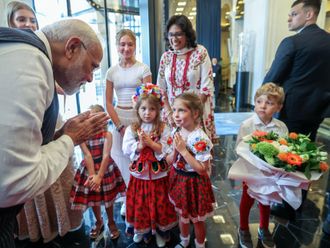
Modi: No problem can be resolved on a battlefield
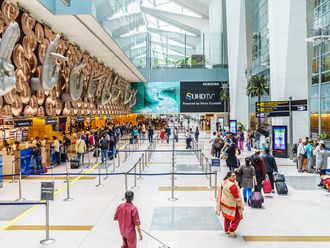
Video: Alert officer saves passenger's life at airport
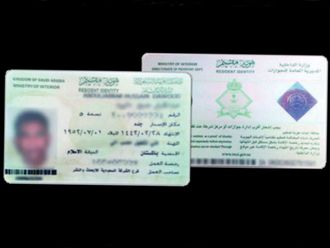
Saudi Arabia: Up to SR1,000 fine for ID renewal delay
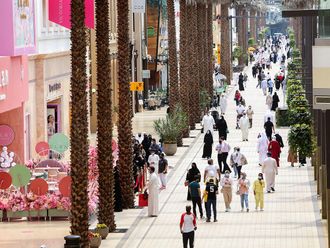
Malls go quiet after Kuwait’s new attendance system
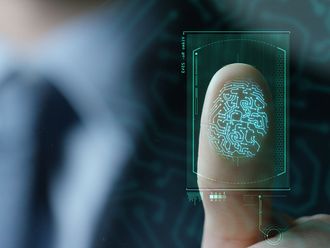
Biometric fingerprinting nets hundreds of outlaws
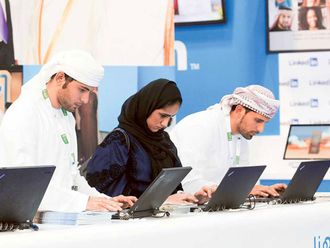
70,000 jobs on new Saudi unified employment platform
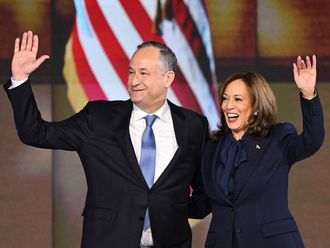
Harris accepts Democratic nomination, vows to unite US
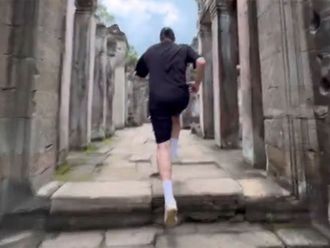
Watch: TikTok tourists recreate Temple Run viral videos
Dubai's rental evaluation changes: what you should know, first test: england in command against sri lanka, rawalpindi test: shadman leads bangladesh’s fightback, experts puzzled as finland pine trees die off, 'very sorry' over drunk e-scooter incident: bts' suga.

Get Breaking News Alerts From Gulf News
We’ll send you latest news updates through the day. You can manage them any time by clicking on the notification icon.

IMAGES
COMMENTS
Indian Prime Minister Narendra Modi was once shunned by the United States. Denied a visa for "severe violations of religious freedom," he was effectively banned from entering the country for ...
Indian television heaps praise on Modi during his trip. Prime Minister Narendra Modi's visit to the United States came Doug Mills/The New York Times. "Super King of Diplomacy," read the ...
Indian Prime Minister Narendra Modi's visit to the US has assumed huge significance amid global economic and geopolitical headwinds. The White House is pulling out all the stops to welcome Mr Modi ...
PM Modi addressing the Indian diaspora at the end of his three-day US visit. (Source: Prime Minister's office) PM Modi US Visit 2023 Highlights: Prime Minister wrapped up his three-day visit to the United States with an address to the Indian community members. Cheering up the crowd, he said that people of Indian origin will not have to leave the US for getting H-1B visa renewal, PTI reported.
The U.S. is trying to draw India closer. Announcing Mr. Modi's state visit, the White House press secretary said the occasion would celebrate "the warm bonds of family and friendship that link ...
Reacting to Prime Minister Narendra Modi's official state visit to the US, Union Minister Ashwini Vaishnaw has said that the Prime Minister's efforts towards the independent foreign policy have ...
Prime Minister Narendra Modi wrapped up his state visit to the United States on Friday. The three-day state visit, his first in nine years, included at least three meetings with President Joe Biden, an address to members of the US Congress, and interactions with some of Silicon Valley's top CEOs. "Concluding a very special USA visit, where ...
President Joe Biden and First Lady Jill Biden will host Prime Minister Narendra Modi of the Republic of India for an Official State Visit to the United States, which will include a state dinner ...
WASHINGTON (AP) — President Joe Biden on Thursday pronounced the U.S.-India relationship never stronger and rolled out new business deals with Indian Prime Minister Narendra Modi as human rights activists and American lawmakers questioned the administration's decision to honor the leader with a pomp-filled state visit. In a joint news conference with Modi, Biden called the relationship ...
India-USA Joint Statement during the Official State visit of Prime Minister, Shri Narendra Modi to USA June 23, 2023 Prime Minister Shri Narendra Modi and President H.E. Mr Joe Biden today affirmed a vision of the India and United States as among the closest partners in the world - a partnership of democracies looking into the 21st century ...
Joe Biden welcomed Narendra Modi to the White House on Thursday for a state visit during which the US and Indian leaders announced defence and technology deals, including a purchase of American ...
June 19, 2023 10:12 PM EDT. O n Thursday, U.S. President Joe Biden will meet India's Prime Minister Narendra Modi on an official state visit in Washington D.C, which includes a South Lawn ...
US President Joe Biden and India's Prime Minister Narendra Modi walk through the Colonnade to the Oval Office of the White House in Washington, DC, on June 22, 2023.
21 Jun 2023. The administration of United States President Joe Biden is scheduled to host Indian Prime Minister Narendra Modi during an official visit later this week, as the two countries ...
Key Points. Indian Prime Minister Narendra Modi will meet President Joe Biden on Thursday during his first state visit to the U.S. High on the agenda will be deepening of defense ties ...
Indian Prime Minister Modi to visit the U.S. NPR's Ayesha Rascoe speaks to Seema Sirohi - a columnist for The Economic Times - about Indian Prime Minister Narendra Modi's state visit to the US ...
News Updates. 23:08 (IST) Jun 21. Prime Minister Narendra Modi arrives in Washington, DC. Earlier in the day he led the Yoga Day event at the United Nations Headquarters in New York. 21:43 (IST ...
Indian PM Narendra Modi's state visit to the White House and Congress comes at a "strategically important" time in U.S.-China relations. Here's why.
U S President Joe Biden and First Lady Jill Biden have extended an invitation to India's Prime Minister Narendra Modi, who is all set to arrive in the US on Tuesday, June 20. PM Modi's visit to ...
#modiinusa #unitedstates #PMModiUSVisit #pmmodiinusa #washingtondc #uscongressPM Modi addressed a Joint Sitting of the US Congress. He spoke about the rapid ...
Biden and Modi held the brief news conference on Thursday during the Indian prime minister's official state visit to the United States, ... Minister Narendra Modi for a state visit at the White ...
Prime Minister Narendra Modi met US and Indian business leaders in Washington on Friday, the final day of a state visit marked by pledges of deeper US-India cooperation on areas including space ...
Indian Prime Minister Narendra Modi heads to the U.S. this week for a visit billed as a turning point for bilateral relations, with deeper cooperation in defence industry and sharing high ...
This is only the third state visit by an Indian leader to the US, the first two coming in June 1963 (President S Radhakrishnan) and November 2009 (PM Manmohan Singh). Prime Minister Narendra Modi ...
Ukraine President Volodymyr Zelenskyy acknowledged the significance of Prime Minister Narendra Modi's visit to Kyiv on Friday, as he listed the agreements reached by the two countries to deepen ...
NEW DELHI: Prime Minister Narendra Modi's upcoming visit to the US is being hailed as a watershed moment in Indo-US ties that may see several pacts inked for better cooperation across sectors ...
PM Modi's visit to the US LIVE Update: Prime Minister Narendra Modi is visiting the United States from June 21-24 at the invitation of US President Joe Biden and First Lady Jill Biden. Ahead of Modi's expected departure today, Foreign Secretary Vinay Kwatra shared details on the prime minister's itinerary during a special briefing. His agenda includes a series of high-level meetings on defence ...
Prime Minister Narendra Modi of India in Warsaw on Wednesday. ... war. Mr. Modi is the highest profile visit by a leader of a nation with close trade ties with Russia and political neutrality on ...
1. President Joseph R. Biden, Jr. and Prime Minister Narendra Modi today affirmed a vision of the United States and India as among the closest partners in the world - a partnership of ...
Kyiv: Indian Prime Minister Narendra Modi used his first visit to Kyiv on Friday to again call for a diplomatic solution to more than two years of war with Russia, saying he stood "firmly for ...